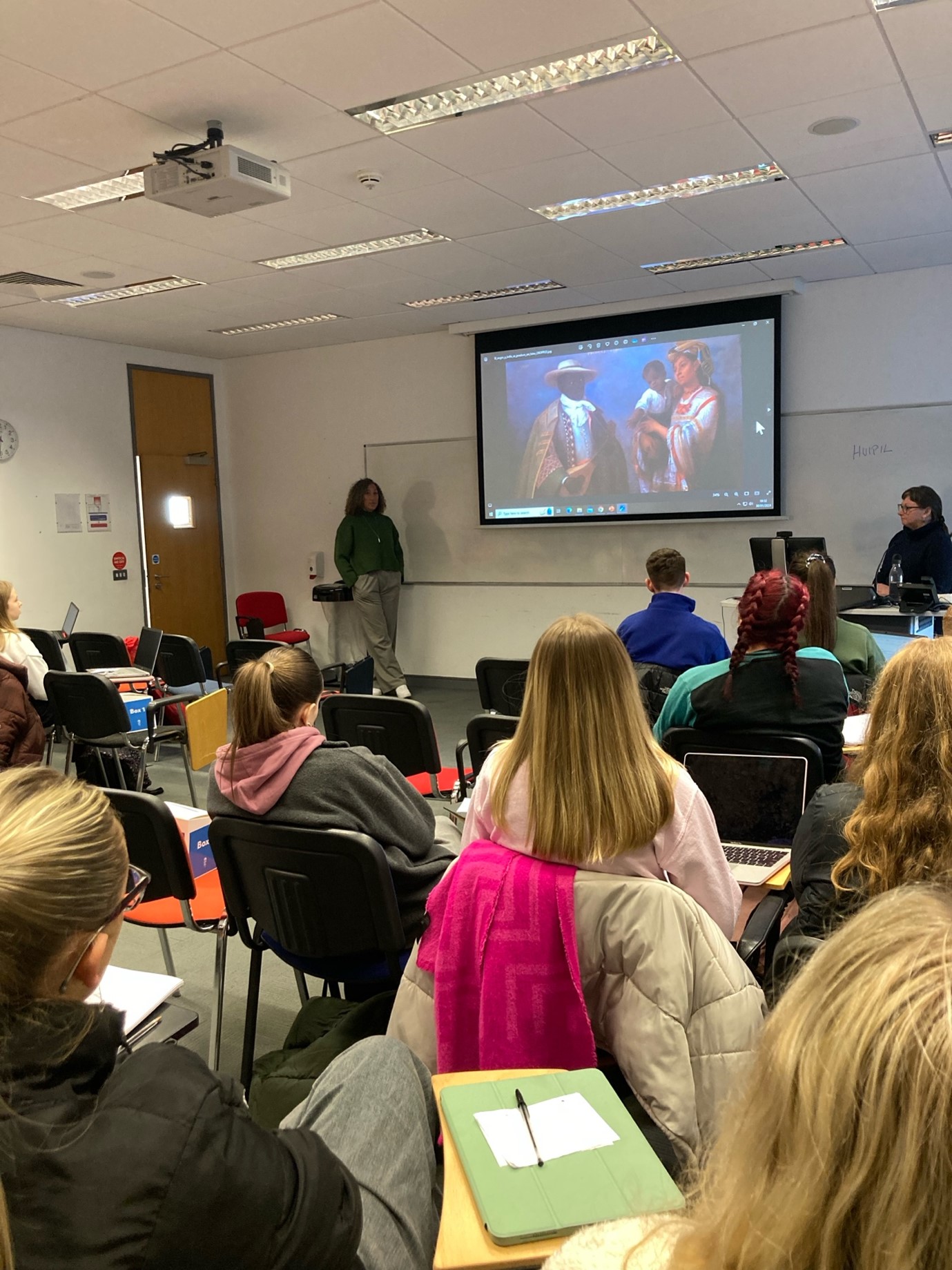Enriching Our Student Experience
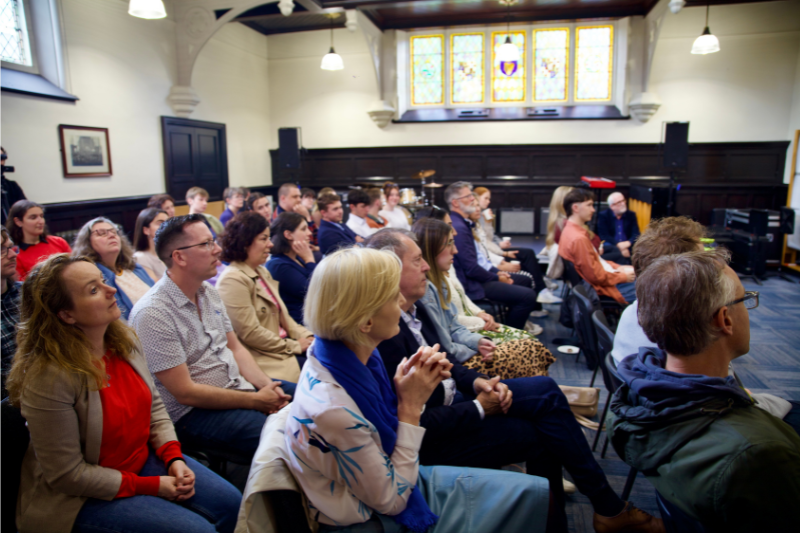
We have been celebrating the incredible achievements of our students in our inaugural Student Recognition Award ceremony.
Voted by peers and staff this is a fantastic opportunity to acknowledge those who have made a significant impact in our community in the School of Arts, English and Languages. Whether through excellent teamwork, leadership, or community service, this event shines a spotlight on the hard work and dedication of our students.
Keep reading for categories, nominees and winners – though everyone was a winner in our eyes.
Leadership: Recognising students who have demonstrated exceptional leadership skills
Nominees:
|
Anna Nic Gafraidh |
Aoibhinn Gormley |
Chrissie Mulligan |
|
Cyrus Larcombe-Moore |
Diana Silva Ribeiro |
Giorgia Mannarino |
|
Isabella Watson |
Jonathan McBride |
Liana Mac Intyre |
|
Lucy Cullen |
Lucy Monteith |
Matthew Wilson |
|
Michael Connolly |
Shelby Hanna |
Winners:
Isabella (Gracie) Watson (UG)
Lucy Cullen (PG)
Community: Recognising students who have made significant contributions to community service and volunteer work.
Nominees:
|
Alexandra Stafford-Santana, Kitty Thomson & Hannah Wilson |
||
|
Chloe Carson |
Denise Leal |
Ellis Hociej |
|
Izzy Hayes |
Johnny McCann |
Lauren Osborne & Aaron Tasker-Lynch |
|
Malachy Harris |
Murdo Dutton |
Nina Brown |
Winners:
Johnny McCann (UG)
Lauren Osborne & Aaron Tasker-Lynch (PG)
Innovation: Students who have displayed an outstanding contribution to innovation and creativity.
Nominees:
|
Aisling McCormick |
Alannah Nic Artáin |
Emma de Beus |
|
Erin Stuart & Órla Flint-Ní Chluaid |
Lauren Scates |
Lukas Simanaitis |
|
Matthew Wilson |
Michael Connolly |
Ruby Corrigan |
|
Zara Meadows |
Winners:
Ruby Corrigan (UG)
Aisling McCormick (PG)
Team Player: For students who have excelled at teamwork and collaboration.
Nominees:
|
Anna Bevens |
Arwen Fegan |
Caitlin Kiddie |
|
Halli Carpender |
Jack Lamont |
Josh Mac Coitir |
|
Kristyna Ilek |
Lucien Coole |
Orla Lloyd |
|
Rhian Stone |
Winners:
Orla Llyod (UG)
Kristyna Ilek (PG)
Resilience: Recognising students who have overcome significant challenges to achieve their goals.
Nominees:
|
Anna McGlinchey |
Chrissie Mulligan |
Emma Pope |
|
Lauren Osborne |
Winners:
Emma Pope (UG)
Lauren Osborne (PG)
Culture: For students who have made notable contributions to cultural activities and diversity on campus
Nominees:
|
Aodh Mac Murchaidh |
Jodi Adams |
Kitty Thompson |
|
Lauren McShane |
Michael Connolly |
Winners:
Michael Connolly (UG)
Lauren McShane (PG)
Entrepreneurship: For students who have shown exceptional entrepreneurial skills and initiatives.
Nominees:
|
Daniel Houston |
Laura Reilly |
Lexie Ashcroft |
|
Matthew Wilson |
Winner:
Matthew Wilson (UG)
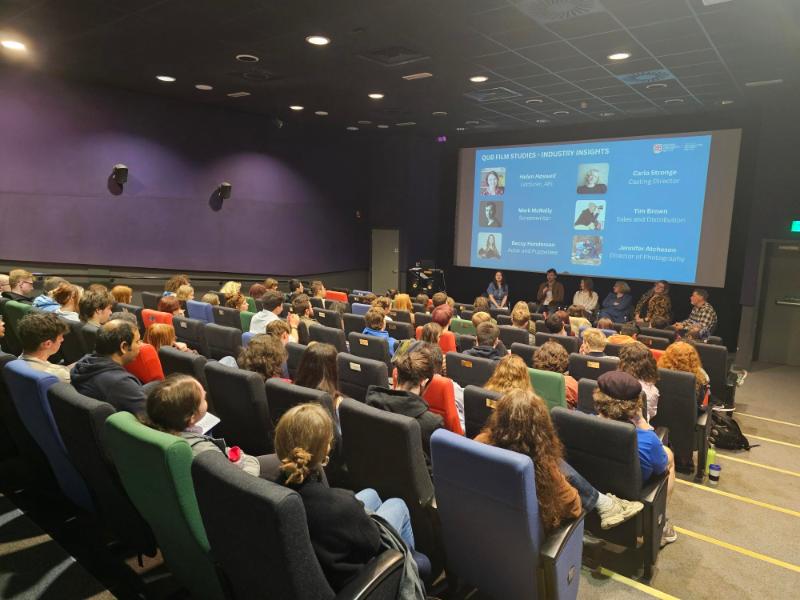
We were delighted to welcome students and industry experts for our annual Industry Insights Panel and Networking session last week. Hosted by Dr Helen Haswell (AEL), the panel, which included Mark McNally (screenwriter), Beccy Henderson (actor and puppeteer), Carla Stronge (casting director), Tim Brown (sales and distribution) and Jennifer Atcheson (director of photography), shared their experiences and talked candidly about the industry and the different and varied routes they had taken into their respective Film and TV careers.
Carla Stronge talked about setting up The Extras Department, and later, her own Casting Agency, and outlined the casting process from script to securing actors to contracts. Tim Brown shared his wealth of experience across different areas of the industry, starting with his work in sales and distribution, selling at festivals, running a business, and pitching, funding, writing, and directing independent films. Jennifer Atcheson shared her recent work as DOP on Jeggies and Irish Son and talked through the creative process, starting with visual referencing and establishing tone, location recces and production design, and script breakdown and shot lists.
We were especially excited to welcome back two QUB Alumni! Mark McNally (Film Studies) talked about his screenwriting journey, winning NI Screen’s New Writer Focus Scheme, and the development of his screenplay, In the Land of Saints and Sinners, which premiered on Netflix in 2024; and Beccy Henderson (Drama), who has had success as an actor (Derry Girls) and puppeteer (The Dark Crystal: Age of Resistance, Eric), talked passionately about overcoming imposter syndrome and nurturing creativity.
The panellists shared the challenges of working in the industry as well as their career highlights, encouraging students aspiring to work in Film and TV to find their passion, to collaborate and to tell authentic stories.
The post-panel networking session in the QFT foyer provided a lively discussion and a chance for students to start making connections with industry professionals. The event received an enthusiastic reception from attendees, and we look forward to holding more Industry Insights events in the future!
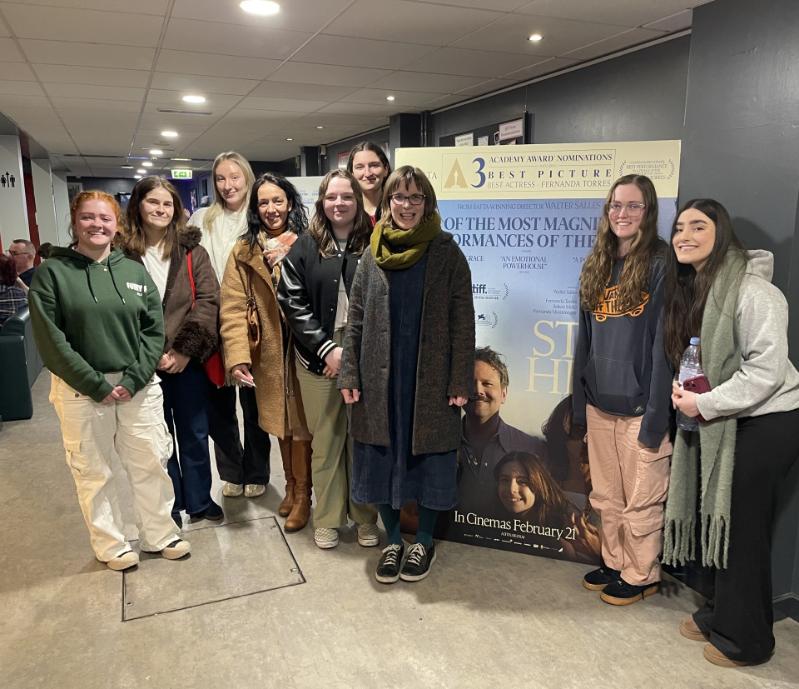
A group of Spanish and Portuguese and French and Portuguese students attended a screening of the Brazilian film Ainda estou aqui (I'm Still Here) in late February 2025 at the Queen's Film Theatre, accompanied by staff from the Spanish and Portuguese subject area. The outing, organised by Dr Tori Holmes (Senior Lecturer in Brazilian Studies), was made possible thanks to support from the AEL Education Fund. Just a few days later, Ainda estou aqui went on to win the Oscar for Best International Feature, the first time a Brazilian film has done so. This was an exciting opportunity for students – and staff! – to see a film that has been making waves both in Brazil and abroad, attracting critical acclaim and large numbers of viewers, as well as sparking discussion about the Brazilian military dictatorship of 1964-1985, which forms its subject matter.
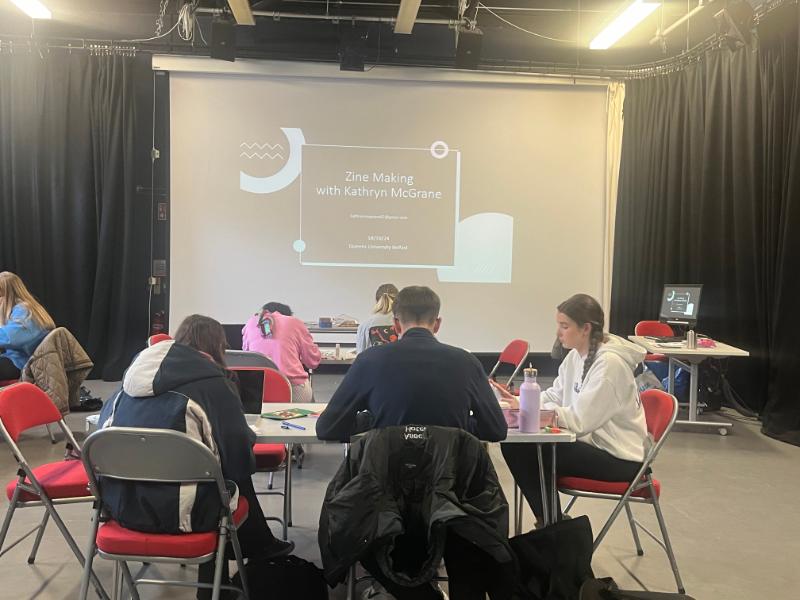
Facilitated by Trish McTighe, visual artist Kathryn McGrane ran a zine-making workshop for students in AEL2001 Gender, Culture and Representation. McGrane’s workshop offered students a chance to do hands-on work in zine-making and complemented the previous week’s session where we discussed plans for the zine assignment in depth.
McGrane is a visual artist and videographer who has a long history of zine-making and working with politicised and democratic visual art forms. She brought significant knowledge and expertise to the session, as well as lots of materials so students could get a sense of what it means to create a zine. McGrane talked firstly about the history of zine making before introducing students to a method for making a mini-zine. Students were then invited to take art materials, newspapers and magazines and draw or collage their zines. Each student was given time to create their own zine before these were showcased for the whole class. We rounded up the workshop with a conversation about the aesthetics, form and audiences for zines. Kathryn very kindly offered to follow up with any students who had questions and was invited to attend our week 12 zine launch session.
The work was designed to give students a chance to engage in creative and practical ways of considering how marginalised groups and subcultures appropriate knowledge from mainstream and dominant cultures and re-purpose this for political ends. The following is a sample of the very positive feedback received from one student:
Just wanted to send a quick email to say that Kathryn's workshop today on Zine making was absolutely amazing. It was such good fun and really informative/helpful in giving ideas about the assignment. Thank you for setting this up!
18 October 2024
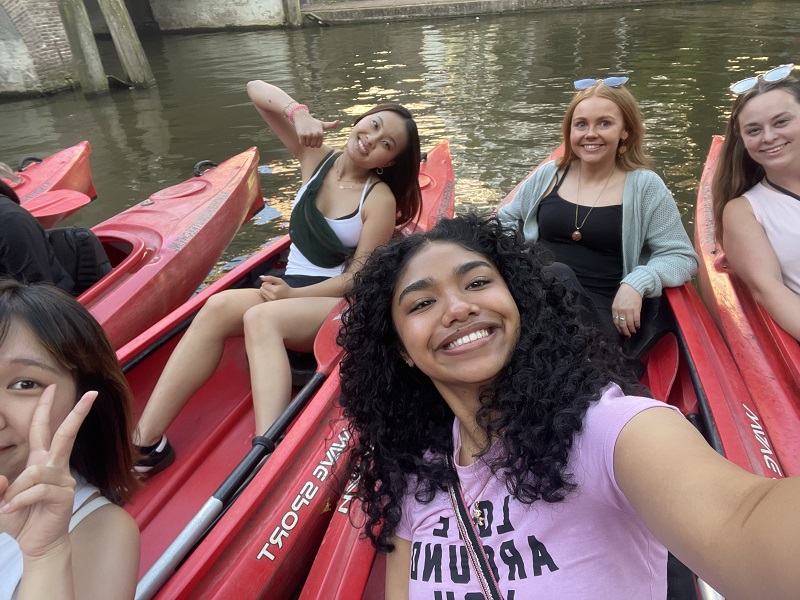
Summer 2024, two Liberal Arts students headed off to Utrecht in the Netherlands for two weeks of Art History!
Liberal Arts third year Annabel Saville and second year Diana Silva Ribeiro took advantage of the Global Opportunities-funded Utrecht Summer School as a way to expand their studies even further. Both students spent two weeks this summer exploring Utrecht and the Netherlands more widely – Annabel combining this travel with a course on ‘Dutch Art: From Van Gogh to Mondrian’ and Diana studying ‘The Golden Age of Dutch Art’.
Annabel noted: ‘I had a really lovely time in Utrecht, everyone was so welcoming. Its geographic centrality in the country also means it is such a good location to explore the rest of the Netherlands. My course in particular was fantastic as they took us on lots of trips all over the country. It's really made me excited to go to Amsterdam on study abroad.’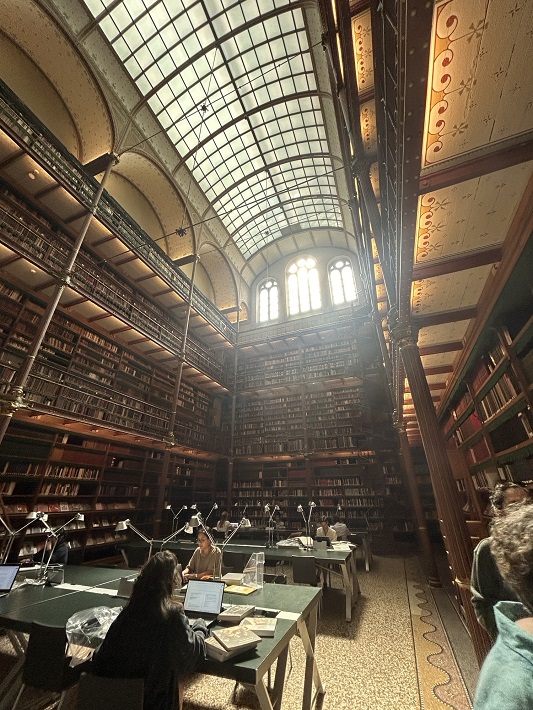
Diana echoed this with: ‘The summer school in Utrecht was simply amazing! During the Golden Age of Dutch Art course, there was fascinating lectures paired unforgettable trips to museums and churches. The vibrant evening activities provided by Utrecht University were a way of making friends and creating lasting memories making my time there extra special. I couldn't recommend the Utrecht summer school enough!’
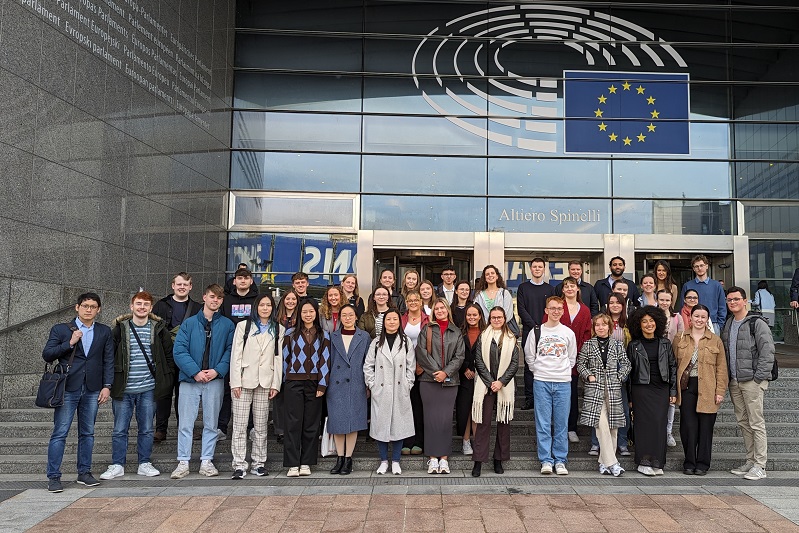
Students visit the EU Commision and Parliament and companies with international reach for an immersive experience of the daily life of translators, interpreters, and language service providers.
Obtaining industry insights and getting a taste of the professional life ahead is crucial for those specialising in translation, interpreting, or languages for more general purposes. During this visit, we took part in talks and discussions about translation and technology, multilingualism in the EU and potential careers for language students, language policies and language planning, and entrepreneurship as a language specialist. We had interactions with practitioners and institutions/companies that require language services, including the European Parliament and Commission (with in-house translators and interpreters), the KBC Group (with the translation unit), and the International Federation of Translators (FIT). 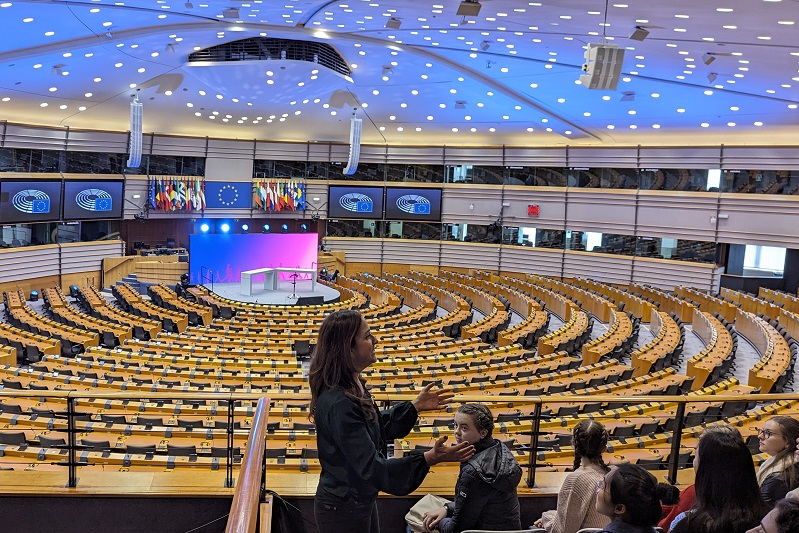 This visit offered multiple perspectives to help students of T&I and languages explore career options and different lifestyles, understand the language services sector, and develop employability for achieving their professional goals.
This visit offered multiple perspectives to help students of T&I and languages explore career options and different lifestyles, understand the language services sector, and develop employability for achieving their professional goals.
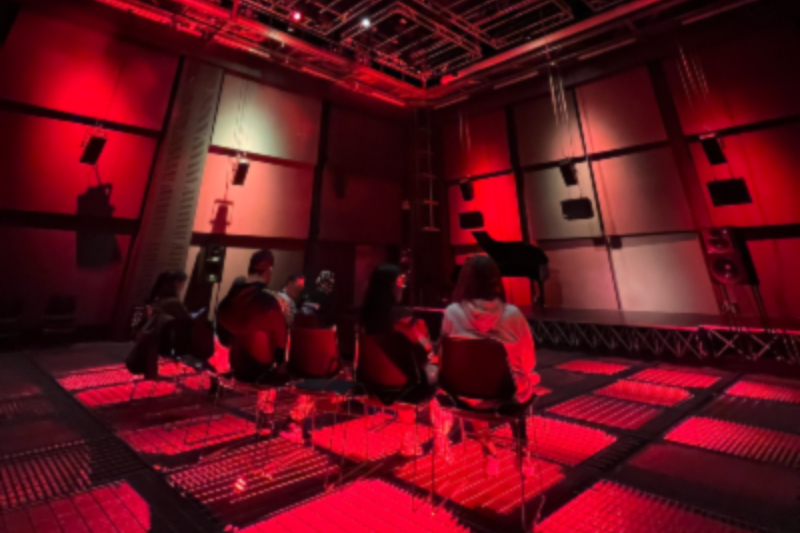
AEL students got the chance to enjoy a distinctive and chilled-out listening experience across music genres at the Sonic Lab, SARC.
The Lab consists of a three-story room, complete with a grid floor, that houses 48 loudspeakers that allow for a uniquely immersive listening experience.
This special event gave students the chance to hear songs from their favourite artists. Signing up before the event, attendees chose some of their favourite songs that were then put together on a unique playlist by Ben Brown from SARC. Students could also make a request at the mixing desk during the session if another song came to mind.
The two-hour session was very relaxed with students able to drop in anytime either on their own or with friends, bringing some work or just listening to the music and chilling out together.
Feedback after the event was incredibly positive and future events are planned. Highlight comments include:
Just more of these please! These are amazing! Thank u for even setting it up in the first place!
and
The event was great with excellent music choices from everybody present and registered!
and
I wished it was longer because I enjoyed it!
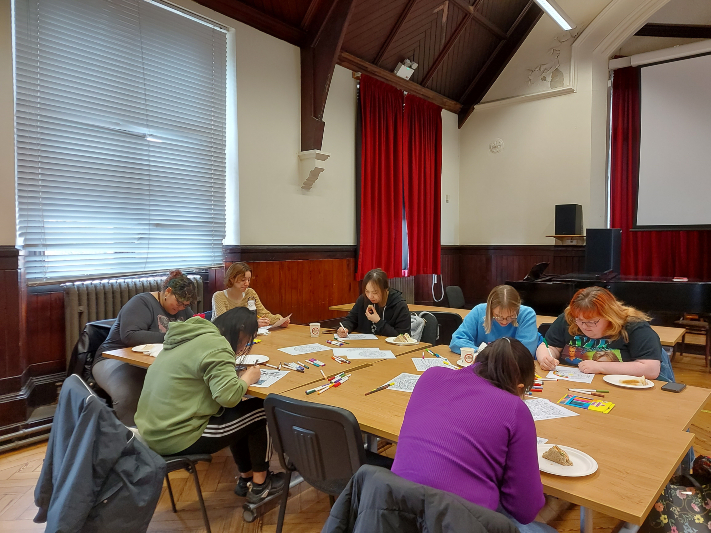
AEL students have been taking a breather and adding a splash of colour to their day at monthly well-being colour and chat sessions.
Research has found that colouring for even 20 minutes can improve mood, reduce stress and increase relaxation, so this newly established and now regular fixture on the AEL eXtra calendar provides a perfect opportunity for our students to take a well-being break.
Scheduled over the lunchtime period, students can bring along their lunch and enjoy the hot drinks and sweet treats provided. Sitting together, they choose pre-printed colouring sheets including animal mosaic pictures (cats being the most popular) and mandala designs.
It does take a certain amount of concentration to make sure that the design is being coloured correctly, some students enjoy quietly working away on their own but still appreciate having the company of others within the AEL community as they do this. Others have enjoyed chatting as they have worked on their colourful creations. Either way the event has been widely appreciated with participants commenting on how the session has been a welcome break from study and helped give them a sense of calm before they head back to the library for more study.
For future events, students will be invited to bring along a craft they are working on, which gives them another chance to relax and connect whilst being creative.
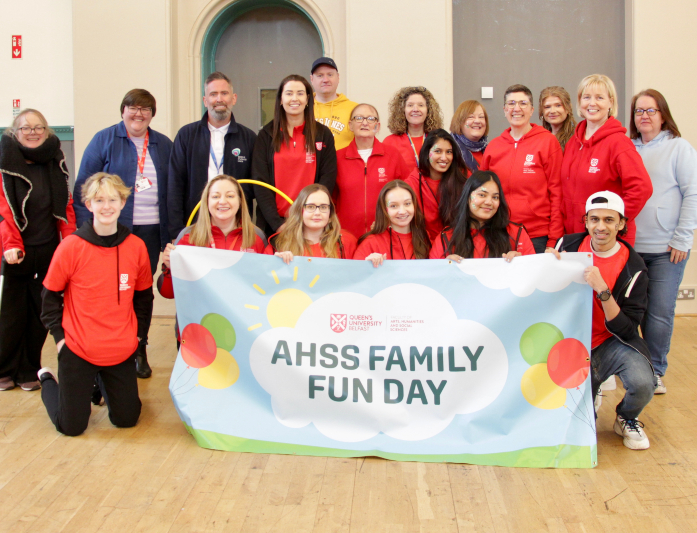
The first ever AHSS Faculty Family Fun Day took place on Saturday 27th April 2024, from 10am - 1pm at Elmwood Hall, and despite the relentless rain, was a huge success with over 200 attendees enjoying the day.
Funded by Students’ Union Fund It, the Graduate School Postgraduate-Led Initiative Fund, the five AHSS Schools and the AHSS Faculty Office, this was an opportunity for School teams to work together to create an inclusive event for students with families and caring responsibilities. One of the main objectives of the day was to promote well-being and work-home balance by offering a day of relaxation and entertainment and there was no doubt that this was achieved.
Having signed up prior to the event, students arrived at a registration point decorated with colourful bunting and flanked by giant QUB signs to collect a wrist band for each child. The wristband gave them access to the soft play buses parked up in front of Elmwood Hall. ‘Sophie’ the sensory playbus made an appearance and was extremely popular.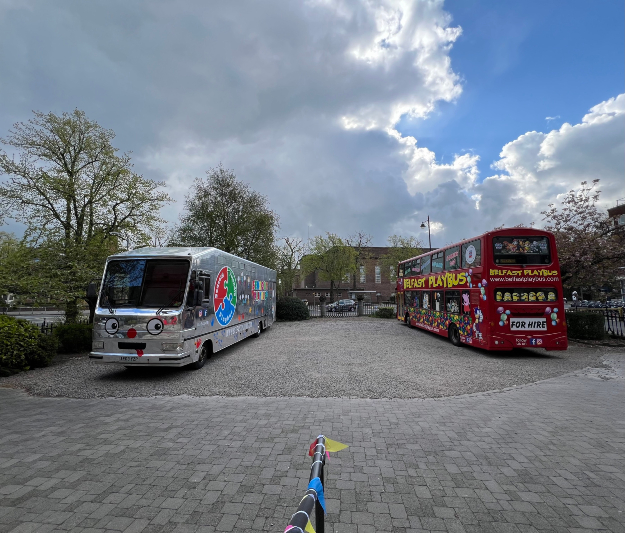 Having her on site allowed for children who may have found the hall activities hectic to have a safe place to enjoy sensory stimulating fun and, from feedback after the event, proved to be a huge reassurance for parents and carers.
Having her on site allowed for children who may have found the hall activities hectic to have a safe place to enjoy sensory stimulating fun and, from feedback after the event, proved to be a huge reassurance for parents and carers.
Each visitor also received a voucher per person at registration which allowed them to order a free hot drink or ice-cream from the refreshment van. All gratefully received this – not least those that had volunteered to queue up in the rain to place their order.
To ensure that spirits were not dampened, even if raincoats were (!), our circus act on stilts wandered around the forecourt under an enormous umbrella welcoming and entertaining the children whilst they queued for the buses. It certainly would have been an arresting sight for anyone passing by. Our circus act later played catch, juggled, and blew giant bubbles entertaining the children in the hall whilst still balancing on stilts.
Once visitors entered the hall, they were greeted by a friendly team of volunteers made up of staff and students who guided them to the various activities. Activities included a tattoo table, face painting, an activity toy area which included hoops and bean bags, and the circus act on stilts.
Children patiently queued to hold or stroke our more exotic visitors of the day including a snake, tortoise, tarantula, and bearded dragon! They also had the opportunity to learn more about them and their natural habitat.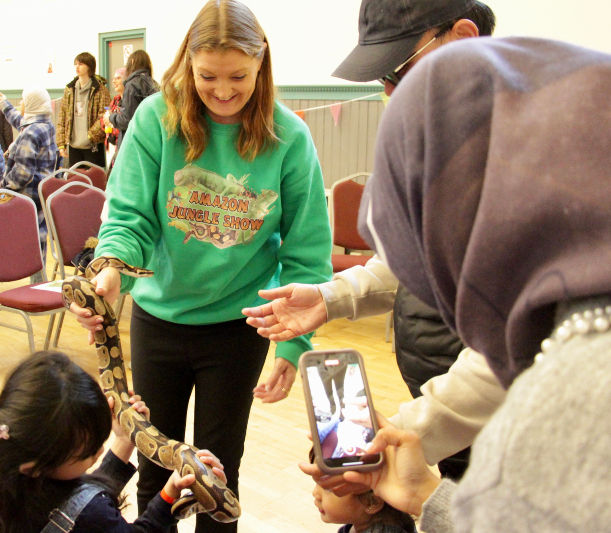 Touching creatures with different body surfaces certainly gave the children a unique sensory experience.
Touching creatures with different body surfaces certainly gave the children a unique sensory experience.
Strengthening a sense of community and facilitating the building up of connections with student peers were also key objectives of the day. It was great to see how parents chatted with one another around the hall as they participated in activities with their children or as they sat around the edge of the hall with a cup of tea building connections and talking about how they juggled family and student life. Parents mentioned how beneficial it was to bring their family along to their place of study and experience an activity on the Queen’s site with other students and staff members.
Throughout the day attendees were guided around the activities and kept safe by a fantastic team of volunteers including students, peer mentors and staff members who had volunteered for the day along with their family members. The team were on hand throughout the day to help run activities and provide a friendly point of contact for any queries.
To top it all off children received a party bag full of sweets, fun activities and small gifts as they headed off at the end of the day.
Overall, it was a great day out for students and their families and the team that helped behind the scenes. Local, international and GB students got the opportunity to mix, and the range of activities facilitated an inclusive event that all could enjoy.
Feedback after the event was positive with a request for more events like this. Comments included:
it helps me as international student meet other students from diverse background to mingle and share happiness together.
and
All the vendors seemed to have at least some experience of working with children with additional needs, so were amazing with me and my little non-speaking friend.
and
It felt like a community event, it was lovely to see familiar faces with their children!
and
very well organised, lovely mixture of events brilliant to be able to include my daughter in coming to “mummy's school”.
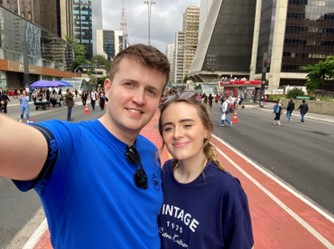
Two final-year students of Portuguese, one from the BA in French and Portuguese pathway and one from the BA in Spanish and Portuguese pathway, undertook a language course in São Paulo, Brazil in March 2024 during the Easter holidays. Their trip was made possible thanks to a JetSet Award from the Faculty of Arts, Humanities and Social Sciences (AHSS), which funds participation in international activities intended to add value to students’ degrees and enhance their skills. As well as attending language classes and practising their Portuguese in informal settings, Adam and Cara visited museums, saw the sights of São Paulo, sampled Brazilian food and drink, and found connections to academic material studied during their course. Digital culture in Brazil is one of the specialist areas of research-led teaching in the Portuguese programme at QUB.
Read Adam and Cara's full report below.
“On 17th March 2024, after having received a JetSet Award from Queen’s University, we travelled to São Paulo, Brazil, with the goal of immersing ourselves in the language and culture, while consolidating and building on our learning over the previous four years.
Towards the beginning of our trip, we visited the Museu da Língua Portuguesa (Portuguese Language Museum) and learnt about the history of the language and its usage in Brazil, including slang terms, abbreviations commonly used in digital communication and differences between the Portuguese spoken in Brazil and the Portuguese spoken in Portugal. It was interesting to read about events which we had previously been taught about in our university contextual classes, such as how digital media was used during the 2013 Brazilian protests, and to be able to see images and descriptions of these events in one of the cities where they took place.
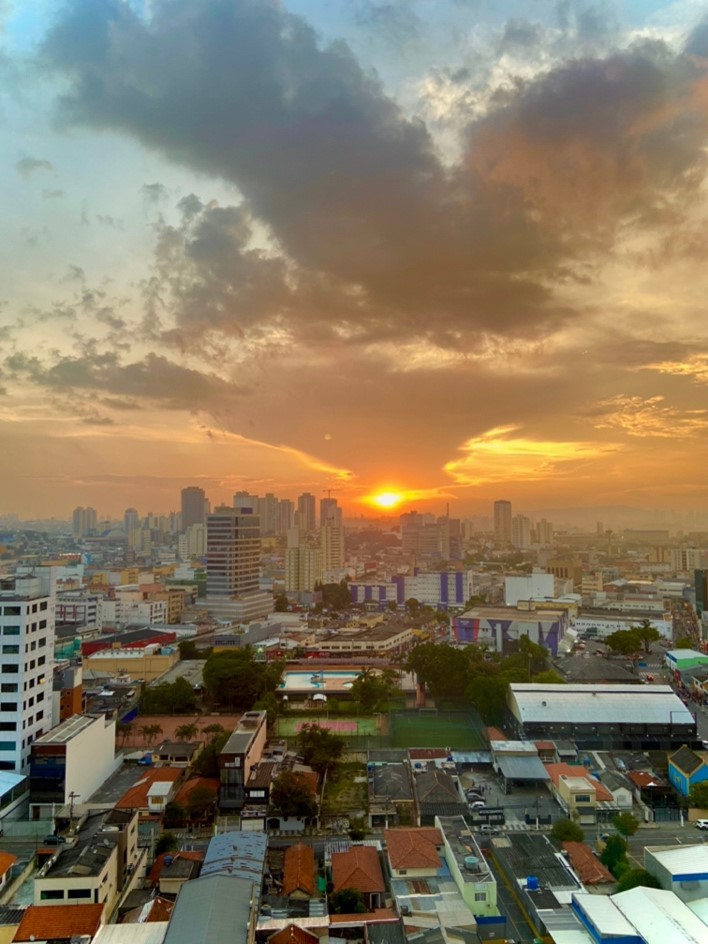 One of the highlights of our trip was visiting Avenida Paulista, known as Brazil’s most famous street. On Sunday mornings, the huge avenue is closed to traffic and hundreds of market stalls line the road. The atmosphere was incredible, with Brazilian music filling the air and street vendors selling local delicacies. It was amazing to see how, once a week, South America’s largest city is given a day to breathe and how the locals congregate to eat, dance, sing, shop and relax right in the heart of São Paulo.
One of the highlights of our trip was visiting Avenida Paulista, known as Brazil’s most famous street. On Sunday mornings, the huge avenue is closed to traffic and hundreds of market stalls line the road. The atmosphere was incredible, with Brazilian music filling the air and street vendors selling local delicacies. It was amazing to see how, once a week, South America’s largest city is given a day to breathe and how the locals congregate to eat, dance, sing, shop and relax right in the heart of São Paulo.
During the trip, we had many opportunities to practise our Portuguese with locals. At a language school that we attended, we revised grammar topics and built on knowledge we had gained at Queen’s. Outside the classroom, we interacted with native speakers in shops, supermarkets and at our accommodation complex. It was rewarding to see how we were able to successfully initiate and maintain conversations, especially in the Brazilian variant of the language, and we were proud of ourselves for using our skills to interact with native speakers. We spent two days meeting up with a friend of ours from the city, who showed us around some of the main attractions, including São Paulo Cathedral, the Municipal Theatre and Avenida Paulista. Challenging ourselves to only speak Portuguese with her, we learnt a lot of new phrases and vocabulary and felt completely immersed in the language.
We loved trying the local food, including feijoada (a meat and black bean stew served with rice). However, the food we enjoyed the most was the sweets, from Brazilian chocolates to the traditional paçoca (a delicious sweet made from ground peanuts, salt and sugar). We noticed that corn was a very popular snack there; you can get it grilled, popped, boiled, in a cake, or even as a juice (although we weren’t the biggest fans of the corn juice!)
Overall, this trip was the perfect way to end four years of hard work at university and it provided us with an invaluable opportunity to explore a country that we had learnt so much about yet had never visited before. Our time in São Paulo has been one of the highlights of our university experience and we are counting down the days until we can return to Brazil once again.”
Report by Adam Smyth (French and Portuguese) and Cara McIlroy (Spanish and Portuguese).
Introduction by Dr Tori Holmes, Senior Lecturer in Brazilian Studies and module coordinator for SPA3131 – Portuguese 3.
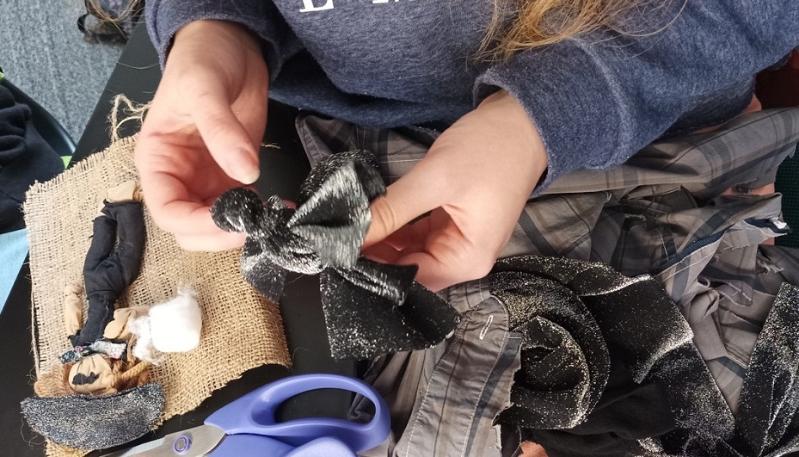
An opportunity for students to have a ‘hands-on’ experience of working with Latin American-based textiles and gain from expert knowledge.
The optional module, ‘Protecting Paradise’ convened by Dr Fiona Clark, investigates different modes through the arts, broadly titled, can engage with significant issues in society and particularly those relating to environmental issues. We consider examples of Latin American film, textiles, and fiction as part of this exploration and emphasis is on praxis and ‘hands-on’ engagement! Thanks to the Education Fund in the School of Arts, English, and Languages, we were able to bring Roberta Bacic, curator and specialist in the arpillera tradition to be part of our class and to run a workshop. This class links in the Conflict Textiles exhibition that runs in the McClay Library, QUB, and database hosted by the CAIN archive, Ulster University. Below, Carolyn, one of our students reflects on her experience of the day.
“On Wednesday 1st November 2023, Chilean arpillera specialist, Roberta Bacic, travelled to Queen’s University to share her extensive knowledge and experience with craftivism. Students of the Spanish Level 2 ‘Protecting Paradise’ module have been learning about the emergence of arpilleras - textiles initially created with re-cycled, household materials as a form of protest in Chile. Students were privileged to listen to Roberta’s first-hand account as they discovered a more genuine appreciation for craftivism and furthermore, to understand the context and stories that come with each arpillera made. They were given the opportunity to investigate the artwork in person, engaging in a comprehensive discussion and analysis of the arpilleras whilst grasping the significance of specific colour and material choices used. Roberta introduced the room to the basics of arpillera making with an exciting hands-on experience, inspiring students for their own arpillera to be submitted as part of their module’s assessment at the end of term.” (Carolyn McDowell, level 2)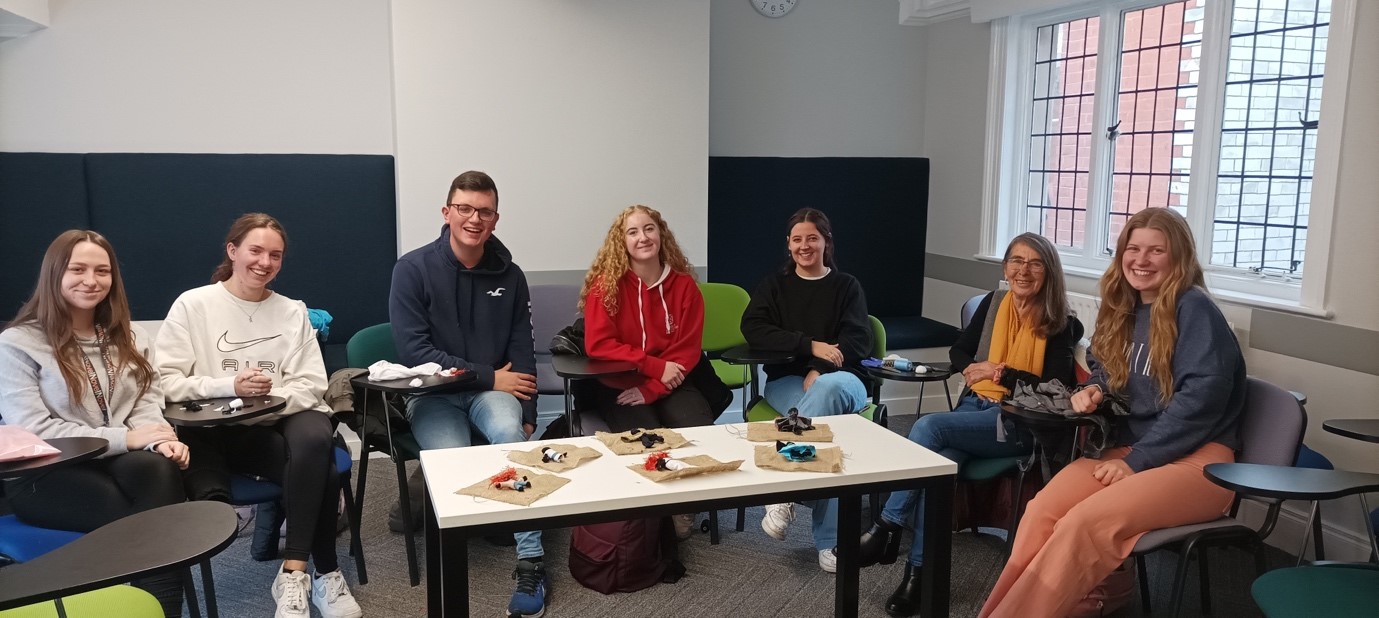
We were delighted to welcome industry experts to talk to students about their journeys into Film and TV work and to offer advice on starting a career in the industry. Hosted by Dr Helen Haswell, the panel, which included Ursula Devine (Independent Film Lead at Northern Ireland Screen), Adam Wilkinson (Location and Production Manager), Sarah Speers (Art Director), Matthew Bradley (Animator at ALT Animation) and Mark McNally (Screenwriter), shared their experiences and talked candidly about the industry and the different and varied routes they had taken into their respective Film and TV careers.
Ursula Devine outlined the trainee schemes offered by Northern Ireland Screen, and Adam Wilkinson and Sarah Speers talked about how the industry has grown in Belfast and shared tips on location etiquette and how to get started in the industry. Matthew Bradley gave a short presentation on the animation industry in Northern Ireland and previewed some of his upcoming comedy animation series. We were particularly excited to welcome back Mark McNally, QUB BA Film Alumni, who talked about his screenwriting journey since graduation and the successful development of his screenplay, In the Land of Saints and Sinners, which recently premiered on Netflix.
The post-panel networking session in the QFT foyer provided a lively discussion and a chance for students to start making connections with industry professionals. The event received an enthusiastic reception from attendees and we look forward to holding more Industry Insights events in the future!
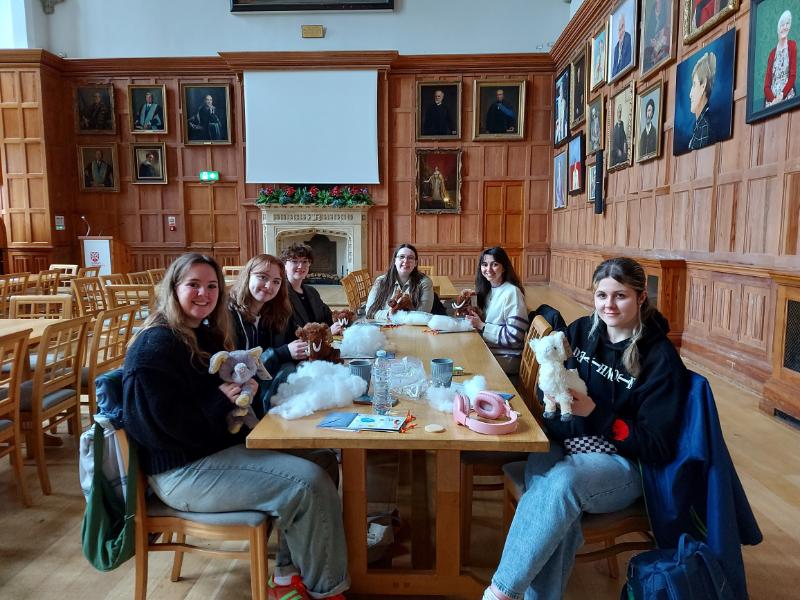
Mental Health and Wellbeing is hugely important to AEL and we strive to encourage our students to take time out from their studies to do something fun and relaxed with fellow students. With this in mind, AEL eXtra ran a Build a Bear workshop in April.
Taking place in the impressive surroundings of The Great Hall, students first arrived and chose their soft toy. This proved to be the most challenging part of the event with a choice of twelve different types of soft toys from woolly mammoths, koalas to monkeys and many more. They then chose stuffing, a heart, a gift bag and a birth certificate to complete with the naming of their ‘bear.’
AEL students were encouraged to take a wellbeing break for the afternoon, and it certainly proved to be a relaxing time. Students had the opportunity to meet others from a different year group and degree pathways over hot drinks and delicious shortbread whilst the bear making commenced.
One lucky student not only got to take a new soft toy away with them but also won a coveted AEL T-Shirt.
Feedback after the event was incredibly positive with a request for the event to be run again in the future. Highlight comments include:
“Had so much fun, best event I have attended. Really helped my wellbeing and mental health.”
“It was really fun! It was good to chat to people from other courses!”
“I really enjoyed the event! The atmosphere was relaxed and friendly, overall very enjoyable! The teddy bear making was easy and resulted in a lovely item.”
“It was fantastic! I got to meet new people in a relaxed environment which as an autistic student can be difficult….”
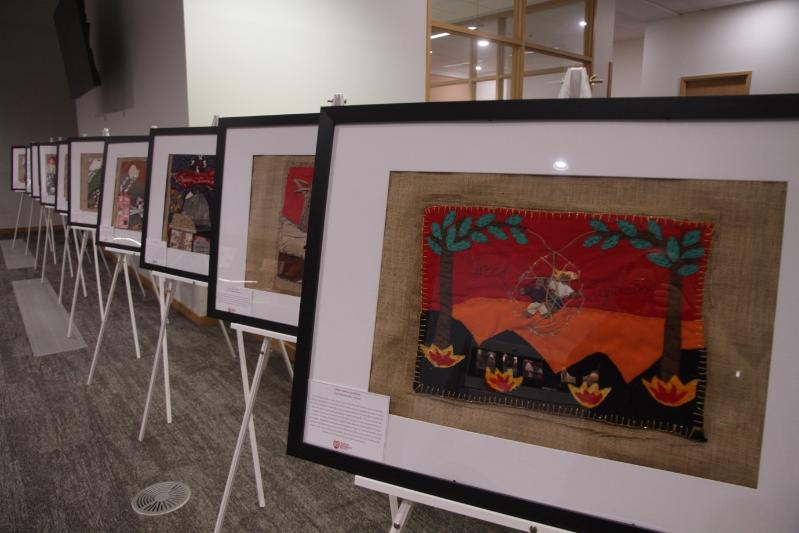
An exhibition of level 3 assessments created by students of Spanish, highlighting the breadth and range of creativity in the language degree.
Running from January until April 2024 in the McClay Library, this colourful exhibition of student work demonstrated the value of including creative practice as a form of assessment within a language degree. Current undergraduates had the opportunity to engage with the work of past students and to learn how they intertwined their lived experience with story telling through textiles as part of a broader experience of Latin American literature and cultures. One visitor commented:
“Wonderful textiles, all weaving stories of real people’s lives and struggles. The colours are stunning and one viewing is not sufficient to absorb the tales being told. Amazing examples of story telling about family life and culture, language and oppression. Tremendous work, well done to all involved.”
This exhibition is a tribute to the inspiration, creativity, and hard work of the students on our modules.
(Photo by Emma Corrigan)
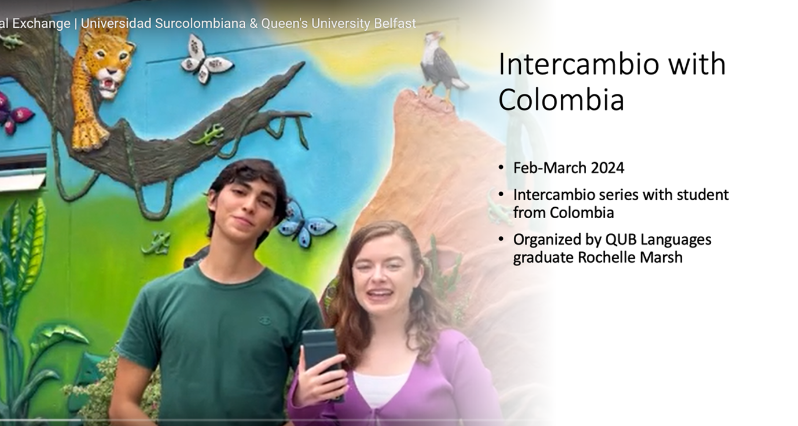
Students of Spanish at QUB and students of English at Universidad Surcolombiana meet online to discuss their experiences of a wide range of cultural and social topics and to learning from one another.
This semester students in Spanish had the opportunity to learn more about language and cultures of Colombia through a series of online intercambios (group discussions) with students from the Universidad Surcolombiana. These events were facilated by one of our alumni, Rochelle Marsh, who is currently teaching at the Universidad and Dr Fiona Clark at QUB. Each week Rochelle devised a series of engaging activities around the themes of travel, music, film, social issues, etc., and students exchanged ideas and insights from their own countries.
Reflecting on the experience, two of the students, Sara and Melissa reported that:
“The Virtual Intercambio gave me an opportunity to practice Spanish in a relaxed, welcoming environment and increased my cultural awareness of part of the Hispanic world I knew little about. Rochelle’s prompts made conversation easy and opened up further conversation and friendships. Although both the Colombian accent was initially a bit of a challenge to understand (as I’m sure our accents were for them!), I quickly adapted to it and was able to keep up conversation throughout the sessions. The Intercambio broadened both my cultural and linguistic horizons, and gave me much more confidence in my abilities going forward!” (Sara Steele, French and Spanish)
“Participating in this Virtual Intercambio has been invaluable for me. I gained significant conversation practice, which helped me improve my language skills, especially in understanding accents and dialects. Moreover, I deepened my cultural awareness by engaging in discussions about unfamiliar topics and cultures. This exposure challenged me to think critically, adapt to different communication styles, and broaden my understanding of the world. Additionally, navigating discussions on unfamiliar topics pushed me to expand my vocabulary and express myself more effectively. To carry forward what I've learned, I intend to incorporate more cultural content into my language studies, such as literature, films, and music, to deepen my understanding and appreciation of the language in its cultural context. The challenges I faced, such as navigating different accents and discussing unfamiliar topics, pushed me to expand my linguistic abilities. Moving forward, I plan to integrate what I've learned into my ongoing language studies by continuing to seek out diverse conversation partners and topics, and by actively practicing to further refine my skills.” (Melissa Nesbitt, International Business with Spanish)
Our thanks go to Rochelle who put so much effort into the planning and to all the students at Universidad Surcolombiana who took part in the events. We were delighted to enrich the linguistic and cultural knowledge of our students through these meet-ups.
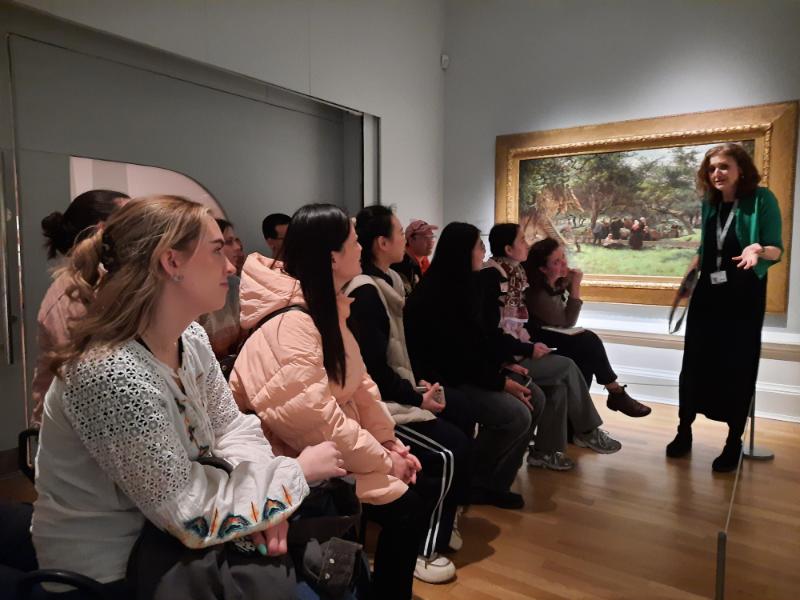
Led by Dr Sarah Eardley-Weaver, the visit to the Ulster Museum was an inspiring and engaging experience that provoked lively discussion amongst the international group of MA and PhD students attending from the Centre for Translation and Interpreting. We are most grateful to Colleen Watters and the team for welcoming us, sharing their expert knowledge, giving us the privilege of accessing various galleries including the Lavery exhibition, and helping us to view the art through different lenses. We look forward to returning to continue our discussions about sensory engagement and inclusivity in further interactive experiences developing our transferable skills in translating art for all.
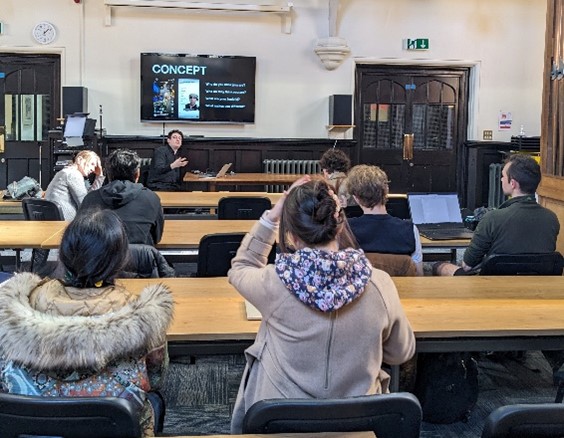
This workshop by AEL’s Dr John D’Arcy on short-form video content production was a brilliant way for students who were complete beginners or those who had some experience to learn about online video production.
One aim of the session was for participants to learn how to develop ideas and to start finding their creative voice and they certainly got the opportunity to do that!
Students began the session by sharing their experience on social media platforms and what they hoped to learn, this led to the session being tailored to their needs which was a real highlight.
Students learnt how to create interest in their content by working out the ‘hook’ to their story. They then covered new video skills such as how to use light and background whilst filming. Later on in the session they had the opportunity to create their own short film on their phones using some of the tips they had picked up.
Dr D’Arcy shared his own experience of what went well with his content creation and what he would have done differently, talking through the analytics behind his content. Time was also spent looking at content creators who had large social media profiles to see how they created interest in their content.
One lucky participant even walked away with an AEL eXtra t-shirt with his name pulled out of the draw, with all enjoying hot drinks and tasty traybakes.
Feedback after the event was positive with a request for more events like this. Comments included:
“Very insightful and excellent, personally tailored delivery.”
and
“Really good workshop by Dr John D’Arcy. Took us through many aspects of short form social content. Really liked how he asked each of us what content we were hoping to create and tied that back to what he was explaining. Learning about content hooks was a big learning point.”
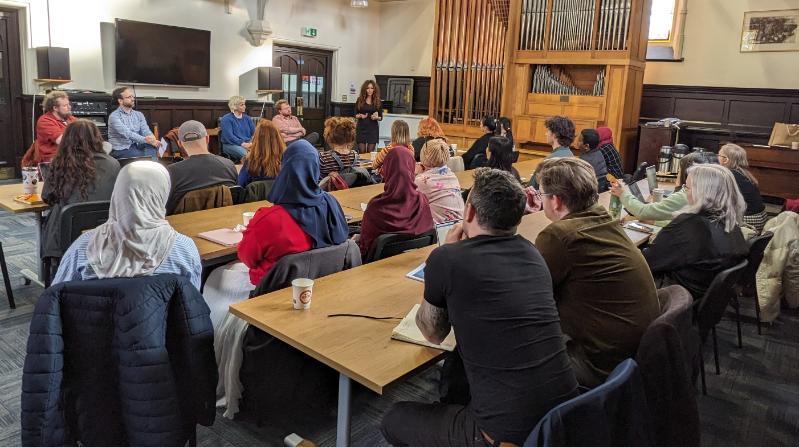
A wonderful, affirming event, this panel discussion sought to breakdown the myths of doing a PhD and to offer support and advice for those who are currently navigating that mountain and Masters students who are at the foothills, wondering if they have brought their climbing boots.
Introduced by the Director of Graduate Studies, Alex Murray, the panel featured speakers from across the School. These included members of AEL teaching staff, Dawn Watson (Creative Writing), Mervyn Marshall (Film) and Scott McKendry (Creative Writing), who were friends and mutual supports during their own PhD experiences. Recent graduate Alex Lucas (Music) and nearly completed Maisa Suleiman (Translation) also contributed to the discussion.
Some of the advice highlights included:
- Your proposal takes a lot of time and effort but needs to be good. However, it will naturally evolve over the PhD process.
- When applying for a PhD, a good tip is to go to the Library and read some PhDs in similar topics to get a flavour for what is expected.
- When you start your PhD, treat each day like a working day. Have regular hours in your office, or the Library to keep the momentum going, but also to ensure breaks.
- Taking breaks and making connections with other PhD students are crucial to good mental health and wellbeing and also help the creative process.
- When you have a writing block, just get some words on the paper. It is easier to edit a load of words than a blank page.
- Make time for family and friends.
Feedback from the event was overwhelmingly postive and there is definitely an appetite for similar events.
Very helpful - really assuaged a lot of my anxieties around PhD life.
The wealth of experience from the panel was very much appreciated.
Really insightful on what to expect as a PhD student. Helpful information on the application process too.
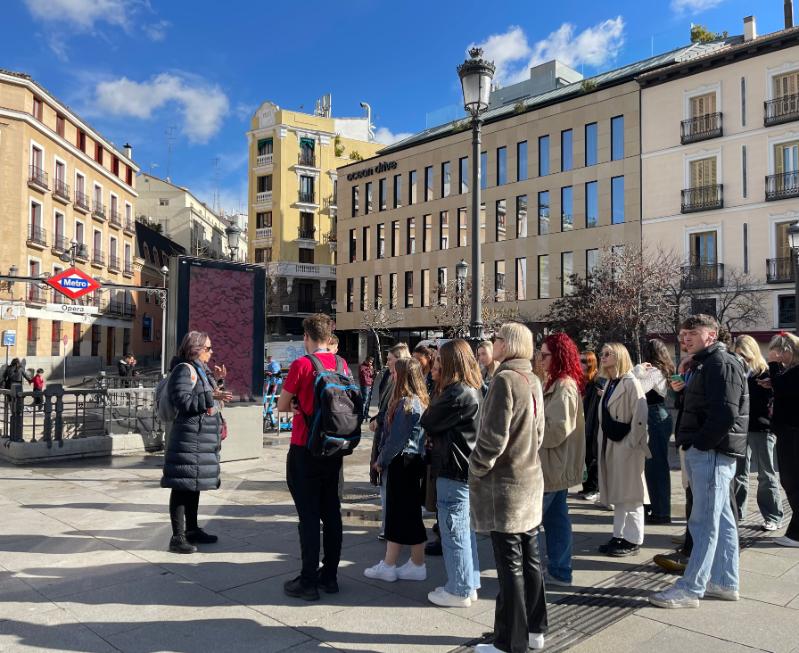
On Thursday 15th February a group of 21 final year students in Spanish and Portuguese Studies, AEL, plus 2 staff members, set off for a 4-day study trip to Madrid. The trip was generously funded through the JetSet programme. Students were selected for participation through an open call to all final year students, though most of the students in the group were enrolled in the optional modules SPA3022 and SPA3021and/or had taken the Larra cursillo in semester one or are currently on the comedia course in semester 2. The programme of events was designed to introduce the city, a major European cultural capital, to those who had not had the opportunity to visit before and specifically to bring key aspects of the curriculum to life.
Thursday 15 February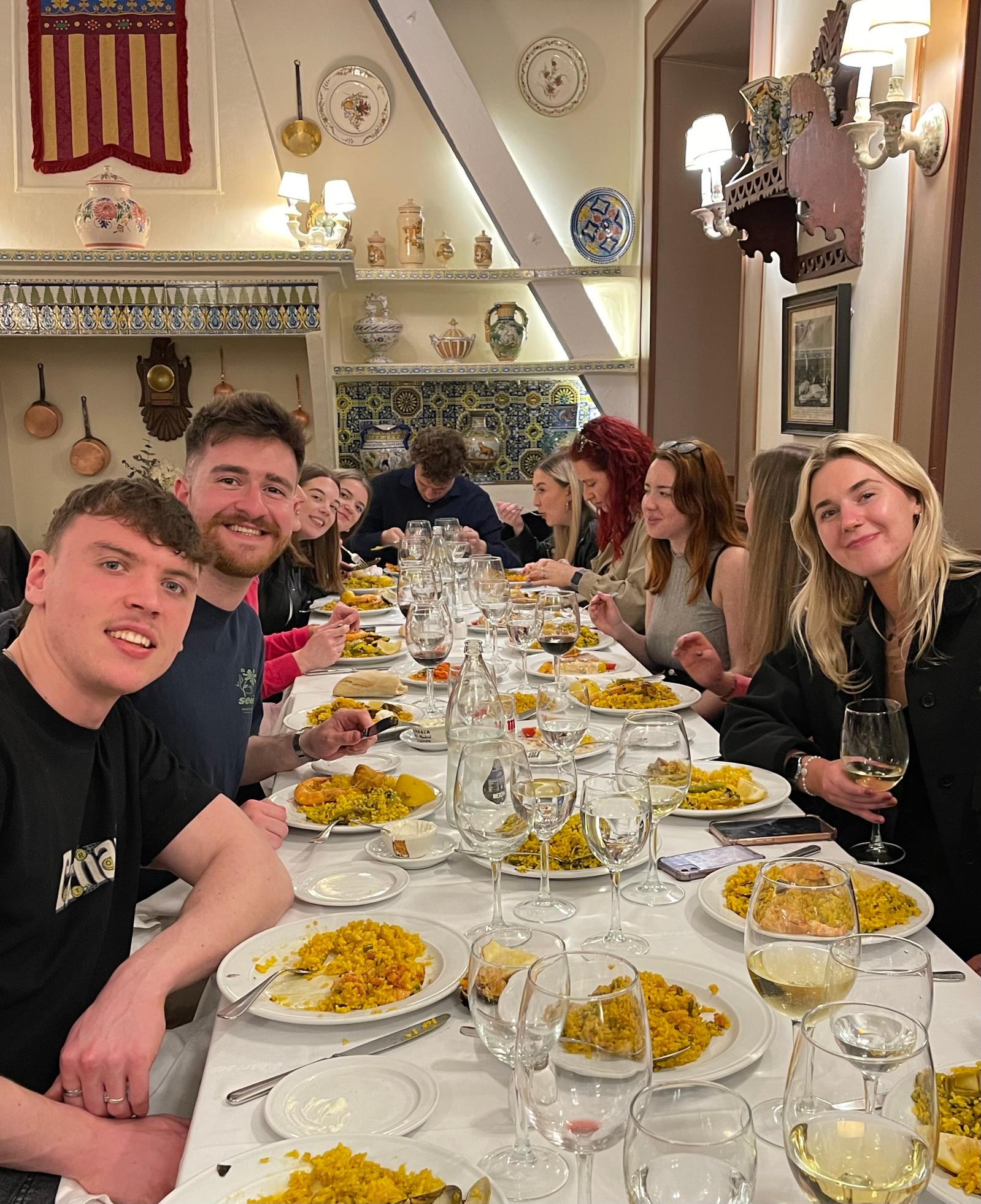
After a long day of travelling (we took the bus to Dublin Airport at 07.40 for a take-off for Madrid at 11.50), we reached our hotel, the Avani Alonso Martínez , shortly after 4 p.m. This hotel was chosen due to its central location (within walking distance of all activities) in a very safe area. An added bonus (as we soon discovered) was the marvellous buffet breakfast! At 20.00, we had tapas al fresco in Plaza de Olavide (unfortunately, that night under the rain). But the weather didn’t dampen spirits, or, as one student put it, the marvellous ‘vibe’ that would come to characterise the whole trip.
Friday 16 February
After breakfast we walked to Puerta del Sol square and, from there, to one of the most culturally significant chocolaterías in Madrid, la Chocolatería San Ginés (founded in 1894 and ‘home’ to many artists, authors and scholars through the decades). After a traditional chocolate con churros, we joined our wonderful guide for a walking tour of the old city, stopping at the Palacio Real, the Plaza de la Villa, the Plaza Mayor – full immersion in Madrid of the Habsburgs! , After lunch we divided into two groups for a guided tour of the Casa Museo de Lope de Vega, the celebrated Spanish 17th-c. playwright, a beautifully restored building that gives deep insight into aspects of life in Baroque Spain. From there, and staying (‘sort-of’) with the ‘Golden Age’, we went to see the play La fortaleza. Written by contemporary female playwright Lucía Carballal, this dialogue with the classic El castillo de Lindabridis by 17th-c. playwright Calderón de la Barca, was witty, moving and powerfully presented. The play was staged by the Compañía de Teatro Clásico (the Spanish equivalent of the Royal Shakespeare Company). We ended the day having dinner at La Barraca restaurant, a classic Madrid venue, whose walls are adorned with photos of famous guests.
Saturday 17 February
Day 3 began with a walk to the Museo del Prado, commenting on historical landmarks along the way (Spanish National Library, Café Gijón, 18th century urbanistic developments, the fountains of Cibeles and Neptune, among many others). Once in the Prado, our guide was a university lecturer at Madrid University, who told us everything there is to know about the painters Velázquez and Goya. Students then were free to stay on and enjoy the paintings or explore other nearby attractions (e.g. the Retiro park).
Sunday 18 February
Free stroll during the morning (oh, those amazing blue skies of Madrid!)
Transfer from the hotel to the Airport at 15.00. Arrival at Dublin at 19.55 local time. We arrived in Belfast by bus at 23.40.
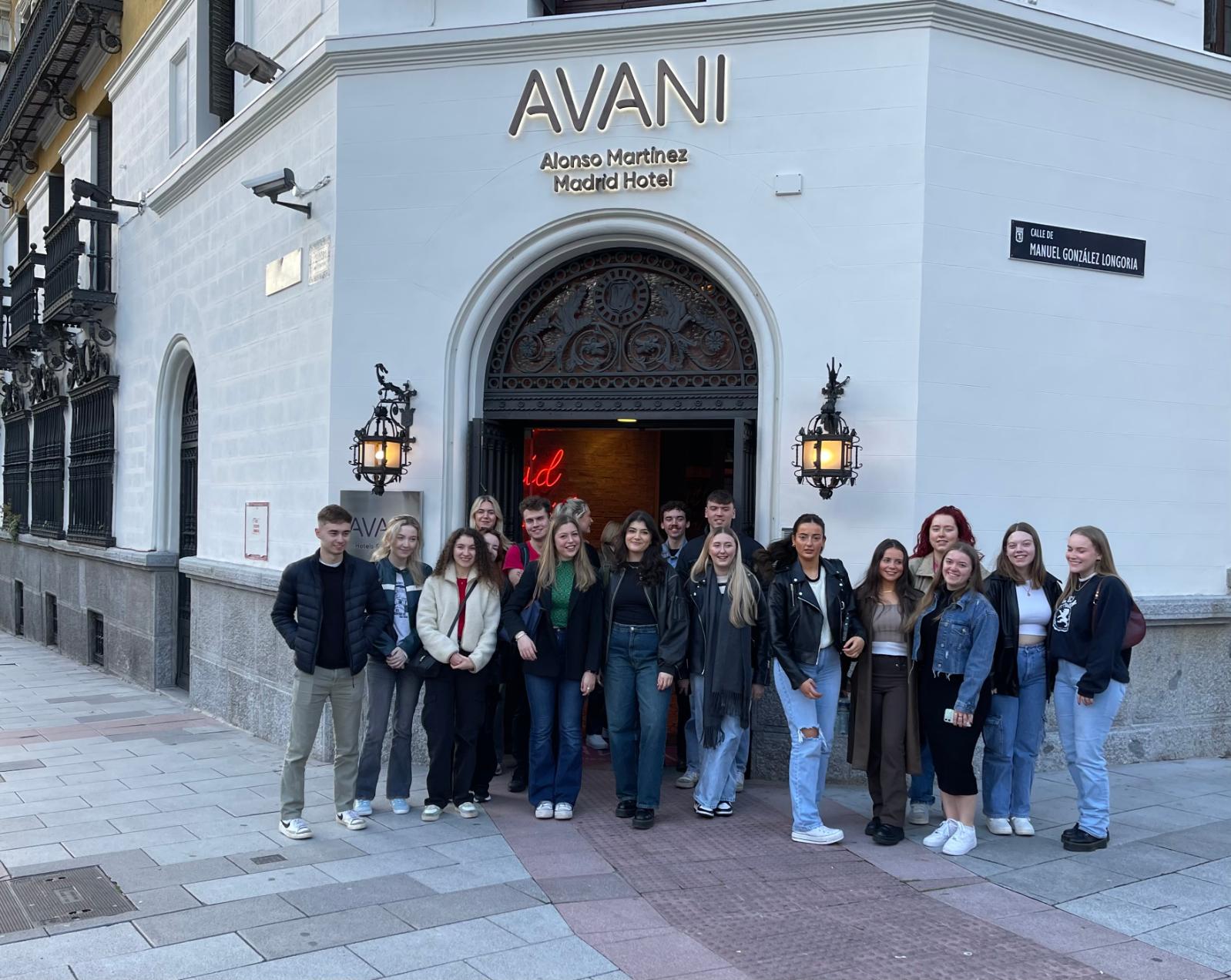
The whole group expressed their enthusiasm for the study programme of the trip, both in relation to the cultural and linguistic content. For some, this trip was one of ‘the highlights of their university years so far’. The staff members involved share the sentiment!
Dr Gabriel Sánchez Espinosa
Spanish and Portuguese Studies, AEL
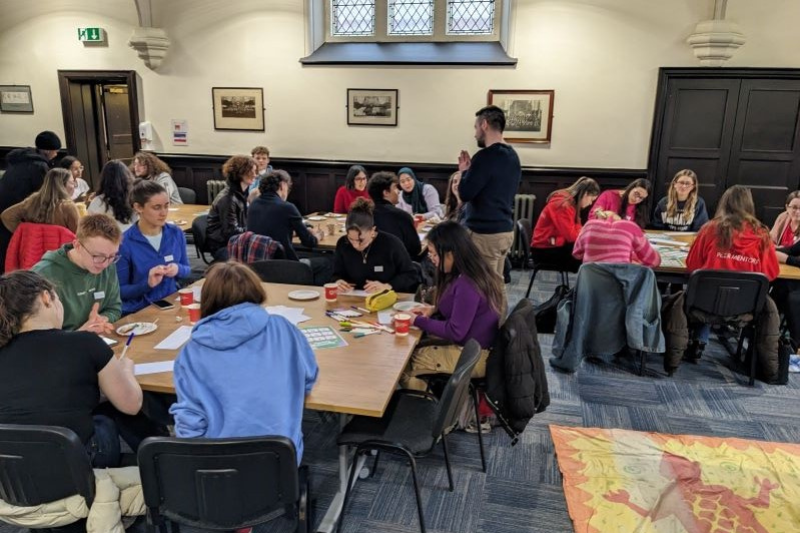
Love was in the air in AEL on Valentine’s day as our students got together to enrich their lives and wellbeing by adopting house plants. With a lovely selection of plants to choose from, students were encouraged to first name their plant and then decorate a sleeve to go around the plant pot. Once completed, they choose their adoptee and repotted it so that it had room to spread it’s wings – well roots anyway!
One lucky participant even walked away with an AEL eXtra t-shirt for his fabulous art work on his pot sleeve!
This was an excellent wellbeing and network opportunity where 40 students got to take a break from their studies and to engage with their peers in a relaxed and welcoming environment. AEL peer mentors came along to offer their advice and support as well as a representative from Student Wellbeing. 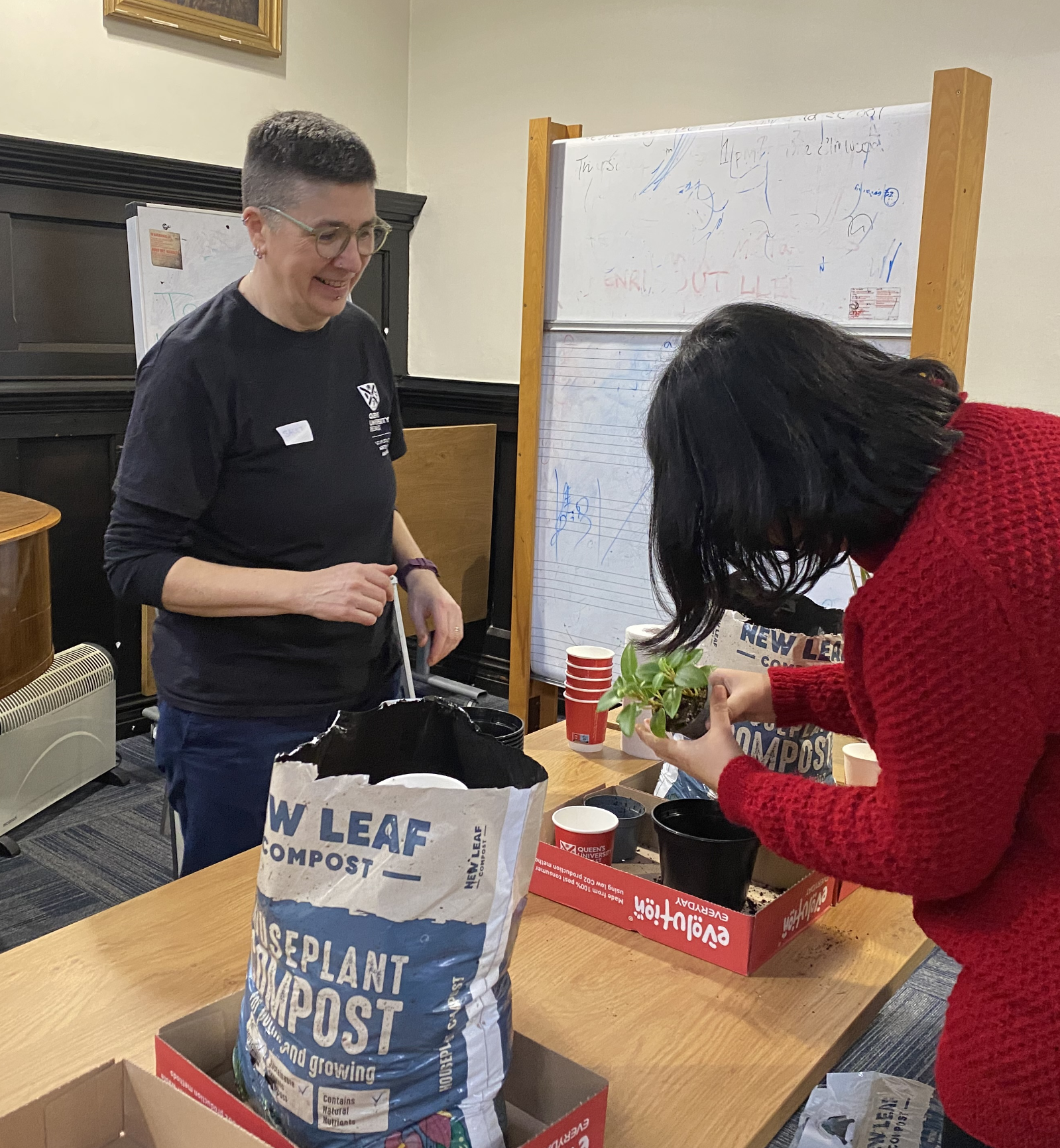
All in all it was a positive and uplifting event. Feedback after the event was super with a huge demand for similar events in the future. Highlight comments include:
‘I really enjoyed getting to know others on different courses and getting the chance to take an hour or so out of the hectic uni schedule!’
and
‘I absolutely loved everything about this event. It was very therapeutic to draw out my banner for my plant as well as pot the plant myself. At this point during the semester, it couldn't have come at a better time.’
We will definitely be running similar events again!
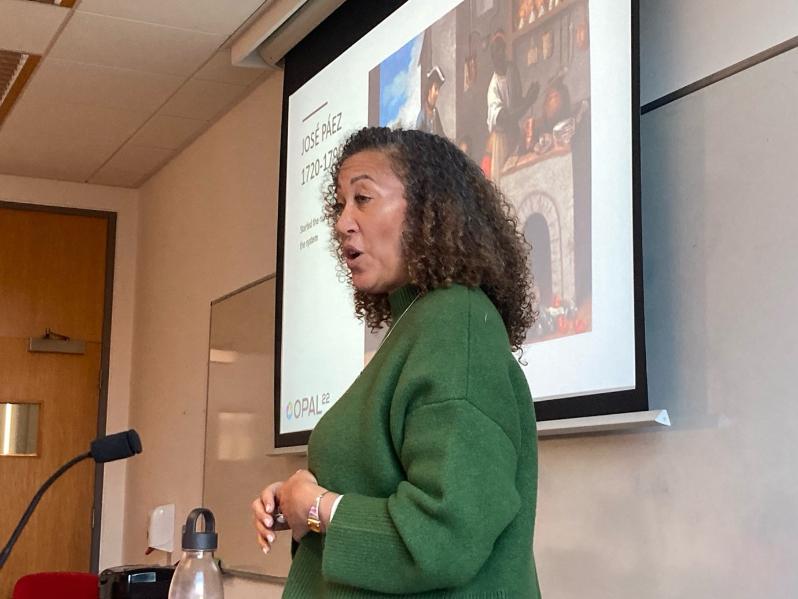
In January 2024, the level 1 students in Introduction to Latin American Studies had the opportunity to work with Tara Munroe, Curator and Creative Director of Opal22 Arts and Edutainment (Leicester, UK).
Studying art and literature from the 1700s can often seem like a daunting task, and perhaps distant to the interests of students in the 21st century. However, having Tara Munroe in our class gave the level 1 Spanish students an opportunity to learn how our approach to early modern culture in Latin America and depictions of the human body, within specific social spaces and practices, is linked to the ongoing question of who controls the narrative in any use of images. Her exciting discovery, restoration and analysis of a series of casta paintings in Leicester Museum provided the core focus for the class discussion. Tara led us through an interactive, visual exploration of the issues, language, and power dynamics at play in these colourful vignettes of colonial life.
|
In addition, students had the opportunity to attend a special screening of the documentary ‘Casta: The Origins of Caste’ and public discussion in the Ulster Museum. Reflecting on the experience, Hannah, noted that: “Tara Munroe came into our class last week to give us an analysis of Casta paintings from ‘New Spain’ (Mexico) during the 18th century, which was something that I found particularly interesting. With her help, the class had an amazing opportunity to look deeper into these paintings and grasp a real understanding of the different social and racial hierarchies which were present during this era. Tara was incredibly engaging, and I felt eager to participate in the discussions.” Having Tara join us in the class provided an important opportunity to learn from someone who is directly engaged in working with communities across the UK to promote the understanding of Black History and encourage discussion around uncomfortable questions and challenges facing us in the 21st century. Dr Fiona Clark (Senior Lecturer in Latin American Studies) |
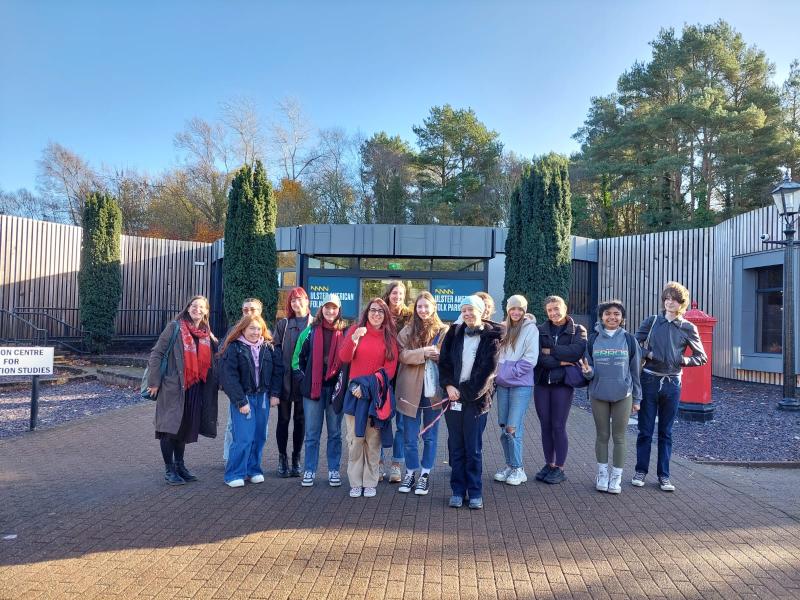
On 8 November, first year Liberal Arts students visited the Mellon Centre for Migration Studies (MCMS) and the Ulster-American Folk Park in Omagh. Dr Patrick Fitzgerald and Liam Campbell spoke with students about the MCMS’s collections, material sources on historical migration, and how these stories might be interpreted in a museum context. Students then toured the Ulster-American Folk Park to put some of these ideas into action!
The Liberal Arts core modules invite students to consider a theme from a variety of perspectives, bringing in experts from different disciplines to speak about their approach. Students this year worked with historians, sociologists, linguists, interpreters, geographers, architectural film scholars, and many others. This trip to MCMS and the UAFP continued this exploration into how migrants and migration has been represented in different contexts and at different times.
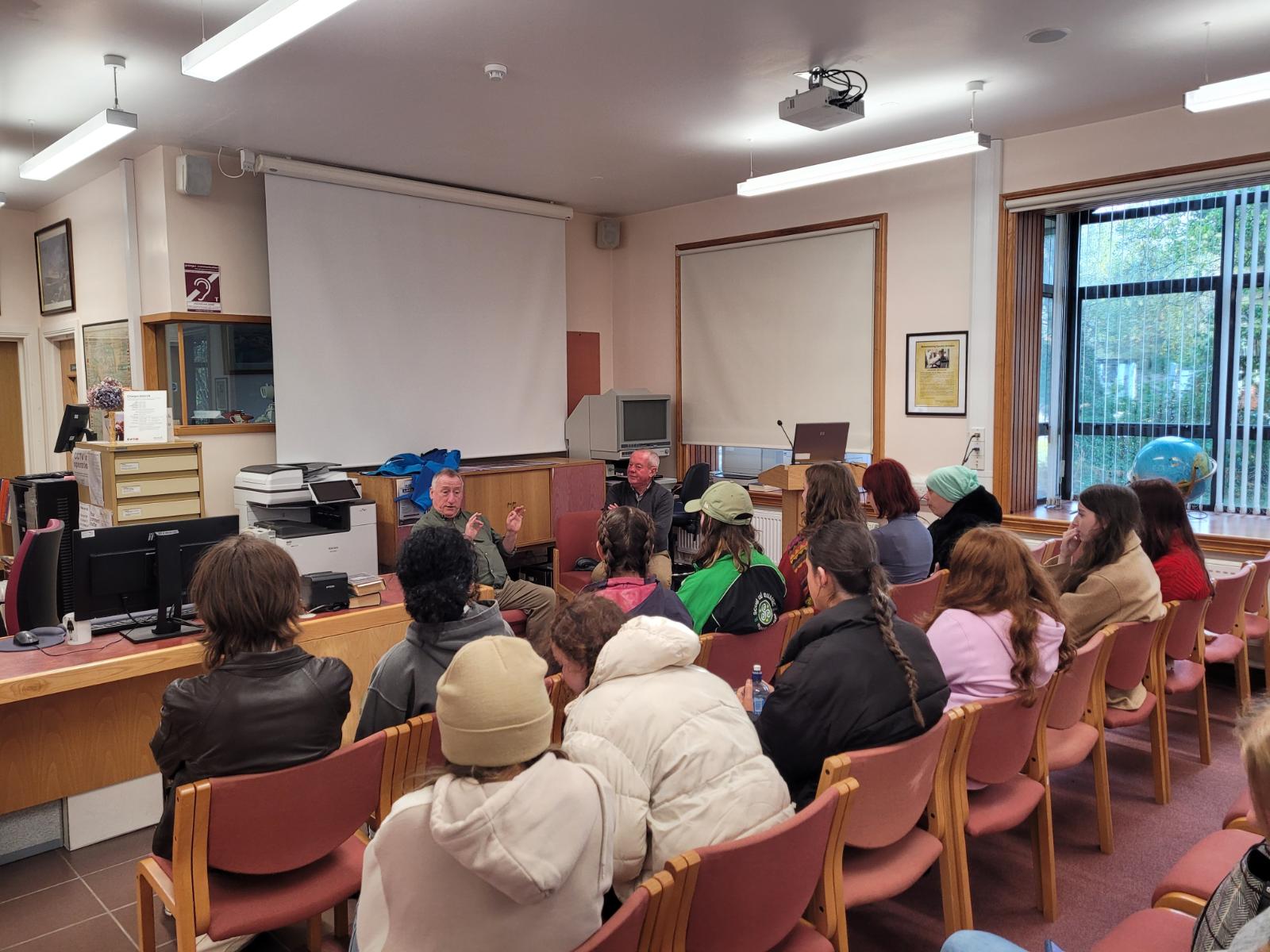 Students, some of whom had first visited UAFP as school children, spoke to MCMS Director, Liam Campbell, and Head of Research and Development, Dr Patrick Fitzgerald, about their own relationship to migration. How stories of migration are understood and preserved, and how museum and heritage sites can influence or spread these stories, formed the basis for many of these discussions. After tea and biscuits, and an explore of the MCMS’s library collections, students were taken around the UAFP. As the Ulster-American Folk Park’s main ‘collection’ is historic buildings, with interpretation provided by visitor guides/interpreters, they were encouraged to think about how space and the literal ‘walking through’ a space dedicated to migration stories and processes influenced their thinking, particularly in relation to historic migration from Ulster.
Students, some of whom had first visited UAFP as school children, spoke to MCMS Director, Liam Campbell, and Head of Research and Development, Dr Patrick Fitzgerald, about their own relationship to migration. How stories of migration are understood and preserved, and how museum and heritage sites can influence or spread these stories, formed the basis for many of these discussions. After tea and biscuits, and an explore of the MCMS’s library collections, students were taken around the UAFP. As the Ulster-American Folk Park’s main ‘collection’ is historic buildings, with interpretation provided by visitor guides/interpreters, they were encouraged to think about how space and the literal ‘walking through’ a space dedicated to migration stories and processes influenced their thinking, particularly in relation to historic migration from Ulster.
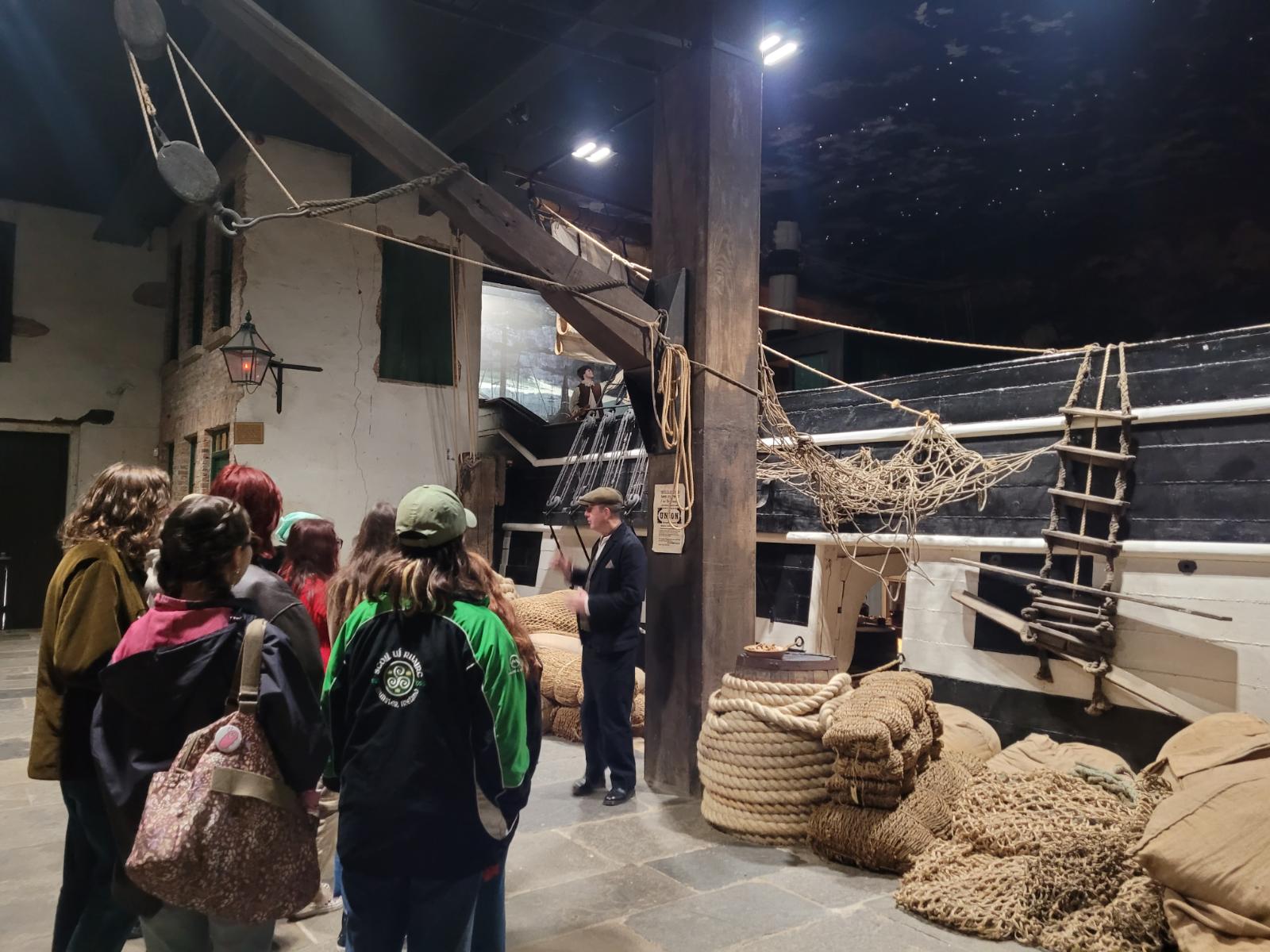 On the way to the main park though, they had a chance to explore the Bad Bridget exhibition, the co-creation of QUB’s Professor Elaine Farrell and UU’s Dr Leanne McCormick and curatorial staff at National Museums NI. This contrast between a more traditional museum exhibition and the folk park prompted even more discussion about the voices that emerge (or are forgotten) from historical sources. These themes will be further explored in the Liberal Arts module, ‘Uses of the Past’, in their second year.
On the way to the main park though, they had a chance to explore the Bad Bridget exhibition, the co-creation of QUB’s Professor Elaine Farrell and UU’s Dr Leanne McCormick and curatorial staff at National Museums NI. This contrast between a more traditional museum exhibition and the folk park prompted even more discussion about the voices that emerge (or are forgotten) from historical sources. These themes will be further explored in the Liberal Arts module, ‘Uses of the Past’, in their second year.

On Friday November 3rd, Kabosh Theatre Company hosted a walking tour performance of the audio play Quartered by the playwright Dominic Montague. Students met in the Cathedral Quarter in the city centre and were guided around the streets as they listened to a narrative about queer life and love in the city. The narrative highlighted significant landmarks in Belfast’s queer history as a means of making and remaking the city spaces and histories through queer eyes, and as a means of asking the listener-walker to move almost in the shoes of the narrator as they described the way that they navigate, as a gay man, the often threatening and homophobic spaces of the city’s interiors, outside the relative safety of what’s known as the ‘queer quarter’.
This event was, on the one hand, a way of offering students an opportunity to engage with live (or relatively live) theatre in the city, given that many of these students come from disciplines other than theatre. On the other hand, we used the performance as the basis for a reviewing workshop which took place the following Monday. Students were asked to write a short review of Quartered and these reviews were used as the basis for the workshop in which we considered what it means ethically and practically to review queer and feminist work in a context like Belfast. Students found the process quite challenging but for the most part the challenge was instructive. A follow up event had the playwright Dominic Montague come to QUB to talk about the work with the students and about his career as a playwright within the local theatre industry. The event provided rich opportunity for students to consider theatre practise in Belfast, the practise of reviewing in an arts context more broadly as well as engage with some of the pragmatic issues of a career in the arts in Northern Ireland.
On Friday the 13th of October, visual artist Kathryn McGrane ran a zine-making workshop for students in AEL2001 Gender, Culture and Representation. McGrane’s workshop offered students a chance to do hands-on work in zine-making. McGrane is a visual artist and videographer who has a long history of zine-making and working with politicised and democratic visual art forms. She brought significant knowledge and expertise to the session, as well as lots of materials so students could get a sense of what it means to create a zine. McGrane talked firstly about the history of zine making before introducing students to a method for making a mini-zine. Students were then invited to take art materials, newspapers and magazines and draw or collage their zines. Each student was given time to create their own zine before these were showcased for the whole class. We rounded up the workshop with a conversation about the aesthetics, form and audiences for zines. And we discussed in some depth the nature of the group assignment for the module, which is to develop a zine over the course of the next few weeks. Kathryn very kindly offered to follow up with any students who had questions and was invited to attend our week 12 zine launch session.
Overall, this workshop had several functions for the module: one, it helped students prepare directly for the modules assessment. Two, it provided contrast to the more cerebral text-based work we have been doing up to this point and allowed students to engage in the process of practical making, as well as reflecting on making. And three, it permitted students a creative and practical way of considering how marginalised groups and subcultures appropriate knowledge from mainstream and dominant cultures and re-purpose this for political ends.
Trish McTighe, October 2023
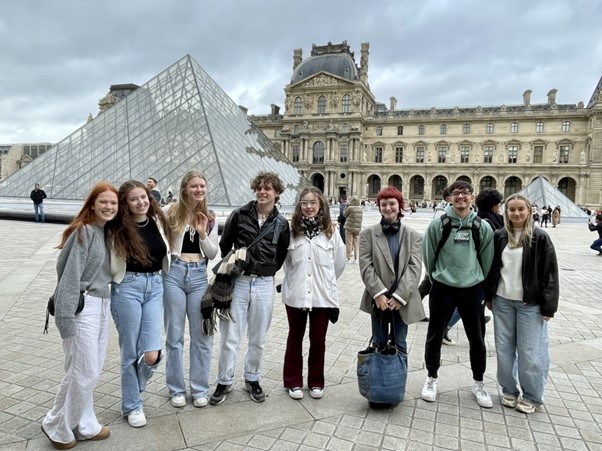
On Saturday 21 October 2023, Dr Steven Wilson met with some of our students who are currently spending their year abroad in France or Belgium. The visit provided an opportunity for students to share experiences and advice with each other. Many of the students had taken Dr Wilson’s second year module, FRH2032 Paris, City of Modernity, so we had a walking tour of some important cultural sites in central Paris they had previously studied (the Eglise de la Madeleine, Place de la Concorde, Jardin des Tuileries, Louvre and Pont des Arts). After lunch in a café on the banks of the Seine, there was an opportunity for further discussion and guidance on any practical issues students were experiencing in adjusting to working or studying in France, before an afternoon visit to a museum.
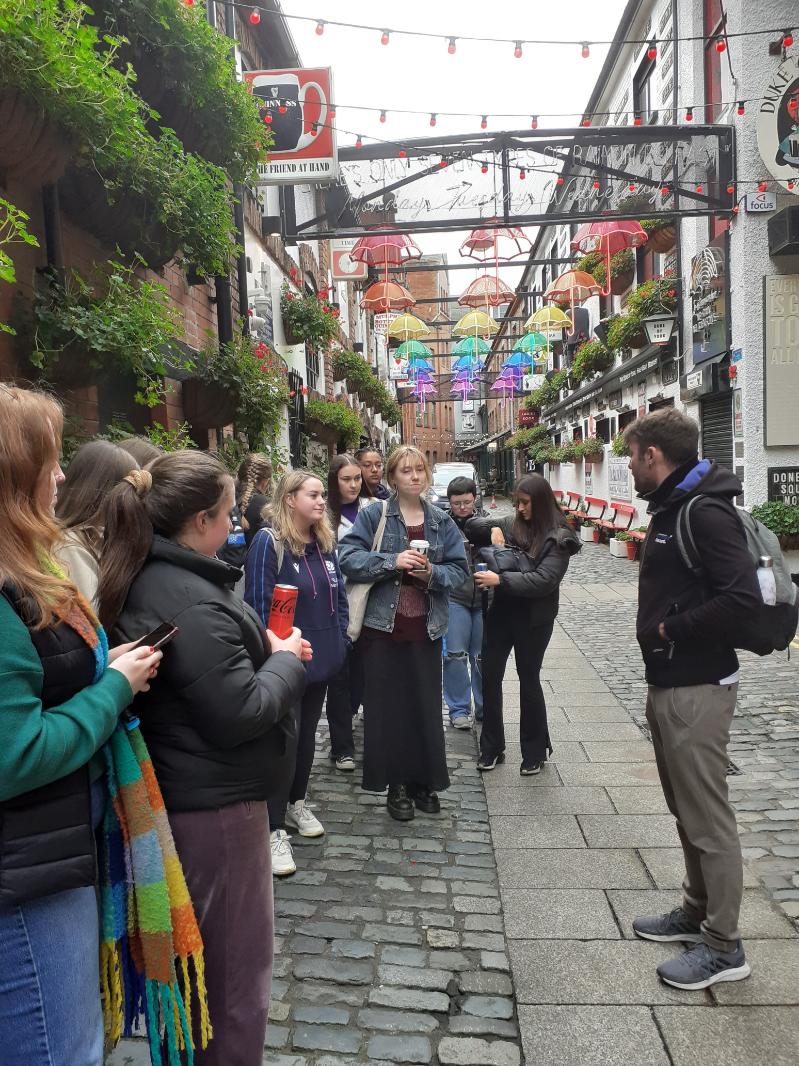
The students in DRA3067 Participatory Performance Practices attended Kabosh theatre company’s walking tour Quartered on 11th Oct. We all gathered outside The Dark Horse and put in our headphones before embarking on a walk which gave us a different perspective on familiar streets. The audio experience, written by Dominic Montague, explores the LGBTQ+ experience of Belfast. In the module we have been exploring different ways through which audiences can participate in performance and this experience focused us on the acts of listening and walking. As the students are starting to develop their group projects for their practical assessment, it was hugely beneficial to gain an experiential comprehension of participatory methodologies. Through the action of walking we considered the changing face of Belfast and its layers of silenced histories, as well as how experiences of place are informed by the identity of the individual moving through them. A bonus for the students was finding out that their tour guide was a past drama student at QUB!
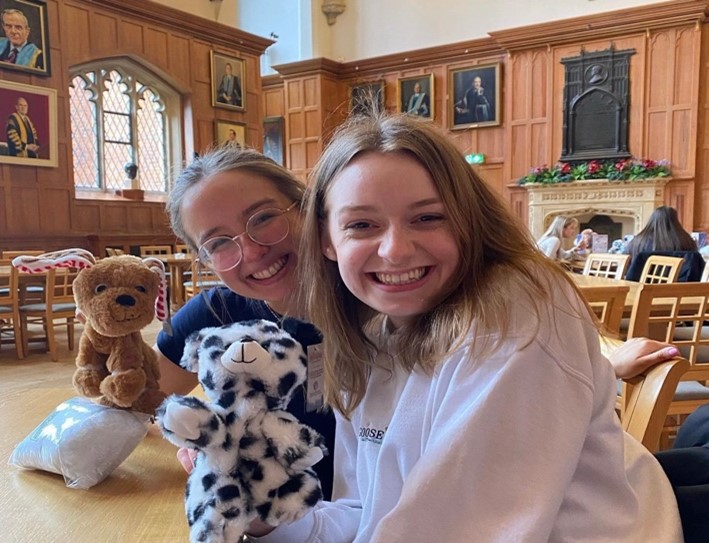
MARCH 2023
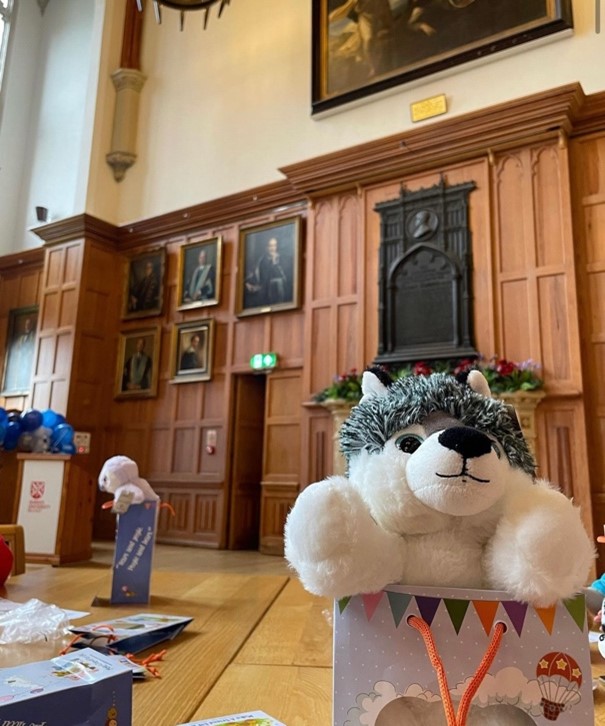 The Peer Mentors for the School of Arts, English and Languages (AEL) ran a Build-A-Bear Workshop in March. The workshop was chosen following the success of the same activity last year. The event took place in The Great Hall and each student was given a different soft-toy animal along with stuffing and a heart. The event was a great success and was very well attended. The Peer Mentors were delighted to create a relaxing environment in which fellow students could take a break from their studies. The workshop also provided students with the chance to meet others from different degree pathways or those in a different year group. This event received praise from the students in attendance and the Peer Mentors are very thankful to those within the School of AEL without whom this event would not have been possible.
The Peer Mentors for the School of Arts, English and Languages (AEL) ran a Build-A-Bear Workshop in March. The workshop was chosen following the success of the same activity last year. The event took place in The Great Hall and each student was given a different soft-toy animal along with stuffing and a heart. The event was a great success and was very well attended. The Peer Mentors were delighted to create a relaxing environment in which fellow students could take a break from their studies. The workshop also provided students with the chance to meet others from different degree pathways or those in a different year group. This event received praise from the students in attendance and the Peer Mentors are very thankful to those within the School of AEL without whom this event would not have been possible.
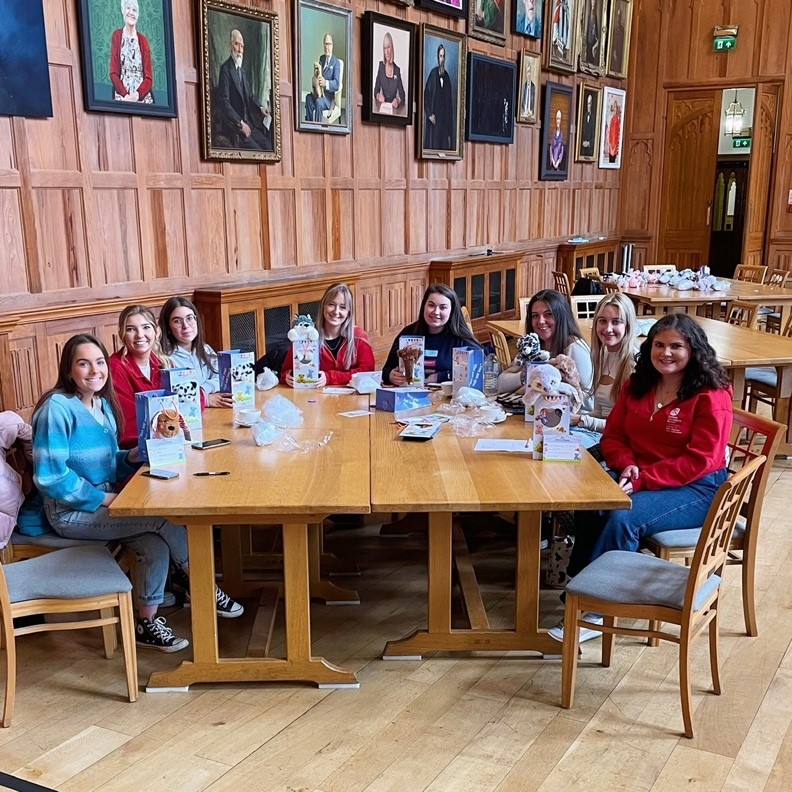 "The AEL build-a-bear workshop was not only a wonderful way to take a break from the busy semester but also a lovely time to chat to people from my school and catch up over a fun activity! The peer mentors were so kind and helpful throughout the session, making us feel very welcomed and at ease. A well-organised and thoroughly-enjoyable event for all!" - Kathy
"The AEL build-a-bear workshop was not only a wonderful way to take a break from the busy semester but also a lovely time to chat to people from my school and catch up over a fun activity! The peer mentors were so kind and helpful throughout the session, making us feel very welcomed and at ease. A well-organised and thoroughly-enjoyable event for all!" - Kathy
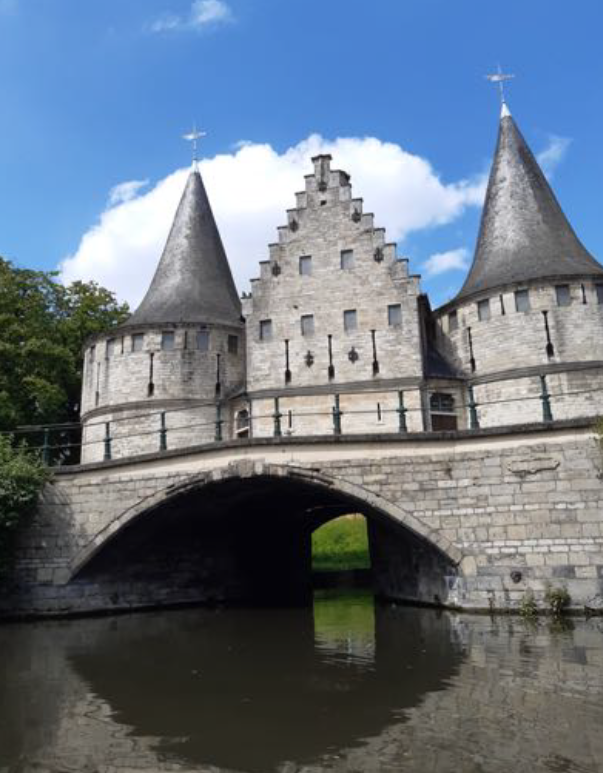
As part of their medieval studies, postgraduates in English participated in a trip to the medieval towns of Ghent and Bruges, in Belgium. Both cities were important centres of commerce throughout the middle ages and are therefore replete with fascinating buildings, monuments and artefacts that afford a unique insight into the lives of ordinary people.
Read the full reports from Aisling Reid and Camila Montero Villamil
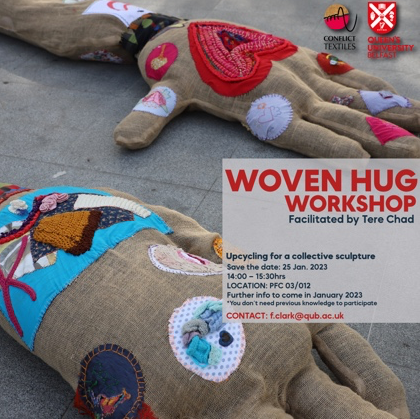
JANUARY 2023
In January 2023, Chilean artist and sculptor, Tere Chad,travelled to Queen’s University Belfast to take part in classes with level 2 and level 3 Spanish students and to offer a ‘Woven Hug’ workshop open to anyone in the University.
The classes in Latin American culture focus on the role of the arts in highlighting issues around the environment and sustainability, and benefited from hearing directly from a Latin American artist about how these themes impact her work and how she has engaged with colleagues and communities in Spain and Latin America to open discussions and share ideas. Inspired by the tradition of arpilleras, hessian-backed textiles from Chile, and using repurposed materials, Tere Chad’s work seeks to bring together communities through sustainable practices and promote the tradition of textile art with a particularly 21st-century dynamic.
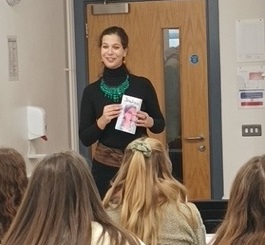 Her workshop also engaged with the ongoing exhibition in the McClay Library that forms part of the Conflict Textiles collection curated by Roberta Bacic in collaboration with the School of Law, and with the upcoming events in the Flowerfield Arts Centre, Portstewart, where Tere and her colleague, Mexican scholar, Cordelia Rizzo, will take part in further community textile projects.
Her workshop also engaged with the ongoing exhibition in the McClay Library that forms part of the Conflict Textiles collection curated by Roberta Bacic in collaboration with the School of Law, and with the upcoming events in the Flowerfield Arts Centre, Portstewart, where Tere and her colleague, Mexican scholar, Cordelia Rizzo, will take part in further community textile projects.
Becca Redmond kindly agreed to reflect on how taking part in the class and workshop enhanced her experience and opened up new avenues to be explored.
A creative heart and a sustainable mind
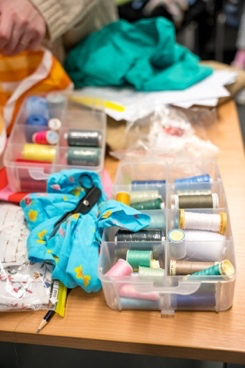 ‘As part of a combined degree, I have the joy of studying both Geography and Spanish, so I couldn’t resist from selecting Dr Fiona Clark’s ‘Recycling Cultures of Latin America’ module in my second year.
‘As part of a combined degree, I have the joy of studying both Geography and Spanish, so I couldn’t resist from selecting Dr Fiona Clark’s ‘Recycling Cultures of Latin America’ module in my second year.
As someone with both a creative heart and a sustainable mind, it beautifully combines some of my biggest interests including environmental consciousness, climate justice, culture, and art. As an extension of the module, I had the opportunity take part in an upcycling workshop with some extraordinary Chilean Artist, Tere Chad, and arpillera curator, Roberta Bacic, which was both enjoyable and insightful.
Roberta taught us the history and importance of the Chilean arpillera; how one can not only use art to build communities, but also as a powerful, political language or tool of resistance, to protest repression, violence and uplift voices that can otherwise go unheard. Whilst Tere on the other hand, got us thinking and feeling, discussing how important it is to disconnect from screens and reconnect with the world around us, whether it be the soil under our feet, the abundance of resources at our fingertips or the relationships that are forgotten or dismissed whilst scrolling. This environmentally sustainable project of embroidery and upcycled fabrics brought together a room of contrasting personalities and backgrounds, yet in the end built a collective art piece and a community of common interests and ideas, so, I would encourage all new students to get involved.’ By Becca Redmond (level 2, Geography with Spanish)
Photos by Harry Thompson.
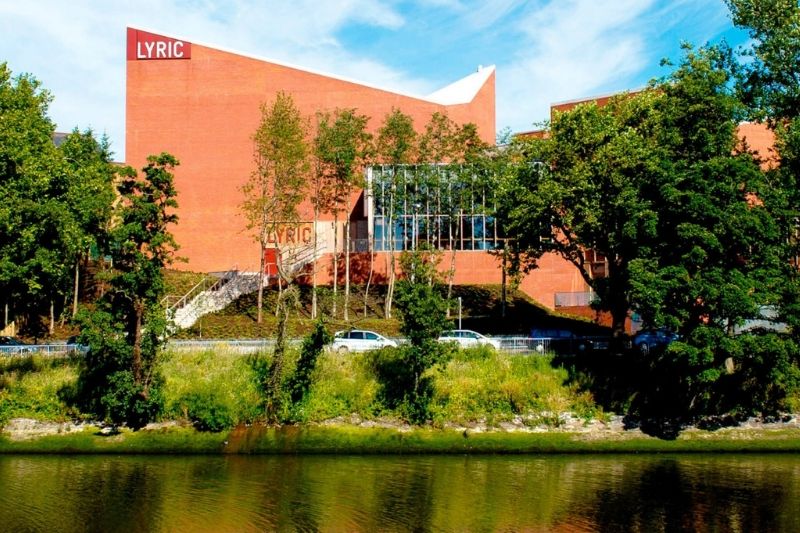
An ECUCFD grant enabled students taking DRA2013 Directing and Design to attend a performance of the new political musical, “Propaganda” by Conor Mitchell at the Lyric Theatre, Belfast, in November 2022. Unusually, the theatre also arranged a pre-show backstage tour which was of great benefit giving the theme of this module. The Lighting Designer for the production, our own Production Assistant Mary Tumelty, also attended adding an extra level of technical detail to the tour. 20 of the 22 students taking the module took up this offer and 8 of these chose the production as the subject of their final essay.
Most of these essays highlighted the radical nature of the design. One student noted: “Mitchell’s original script has a concept based around surveillance and the use of propaganda, which the actual play realises in interesting and visually spectacular ways such as the use of searchlights, the orchestra pit, and the levelled stage, which create a meaningful and unforgettable environment for the piece’s events to take place upon”. The fact that he had previously had the opportunity to explore the backstage environment undoubtedly heightened his appreciation of this radical design approach.
Underlining the value of seeing a live performance another student commented: “When watching the play rather than reading it, concepts such as exposure in an elusively naturalistic setting begin to reveal themselves. We see actors placed on different levels, always visible to the audience, always acting, even when they have finished their scene and are walking backstage. We also see gradual exposure in the actors performances.”
Throughout these essays, students wrote about the design and technical elements of the production with an authoritative command of detail that was clearly enhanced by the opportunity to see backstage before the performances, showing that this was money well spent.
David Grant, Module Convenor
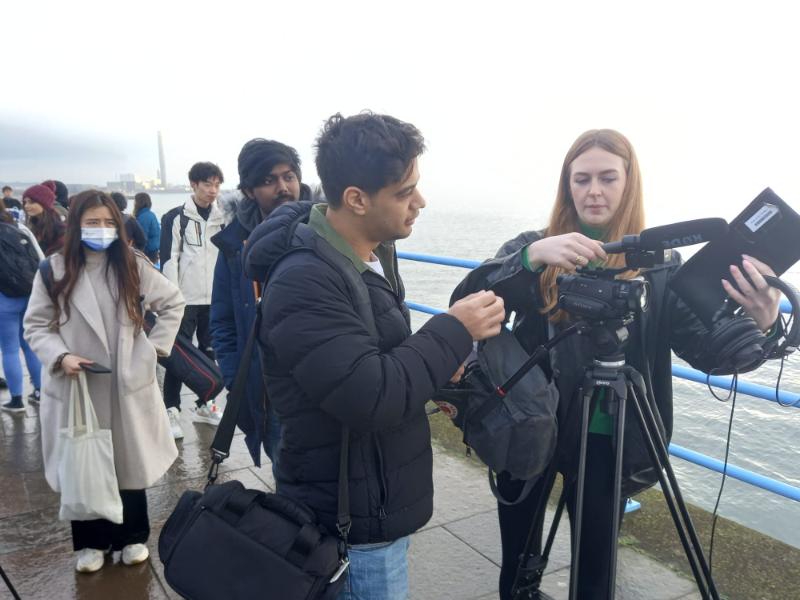
JANUARY 2023
“This fieldtrip to Carrickfergus formed the basis for a module-level collaboration between my MA-level Documentary Practice course and the MSc in Advanced Architectural Design and PgCert Cinematic Architecture, which are under the auspices of Dr. Gul Kacmaz Erk of QUB Architecture. The fieldtrip was the corner stone of a joint assignment between our respective modules, rooted to an ambitious regeneration project for Carrickfergus, being run by the Mid and East Antrim Borough. Students were formed into ten interdisciplinary teams, each of which was assigned a specific aspect of the regeneration plan. Their task was to collaboratively research their assigned aspect and ultimately produce a one-minute research film presenting their findings in an engaging, narrative format. The assignment requires core skills from both the Broadcast and Architecture/Planning spheres and thereby occasioned deep and sustained interdisciplinary collaboration between the students. Travelling as a group (of 52 students) to Carrickfergus enabled my students to encounter key experts involved in the project at Carrickfergus Town Hall; visit various areas involved in the regeneration (Civic Centre, Northeast Bastion, Shaftesbury Park, Railway Station, North Gate, Market Place and the Statue of King William); and initiate their team-specific research on the ground.” Dr Don Duncan, Lecturer in Broadcast Practice
‘It’s a great honour for us to be invited in the Carrickfergus field trip and walking tour. I am very glad that we were given the opportunity to see those historical attractions and shoot a film around the Carrickfergus regeneration project. I love the Carrickfergus Marina, promenade, and harbour view. With a long and fascinating history, in Carrickfergus lies the an articulate, audible voice of the past.’ – Hanling Cao, MA Media & Broadcast Production
‘Carrickfergus was a beautiful city from its castles, its shore to the town itself. Little was known about the city before our trip, but with explanations from the experts with the visionary scenes all over the city, everything was explored. Carrickfergus's rich history might occasionally be a little overwhelming. Over the course of 800 years, an astounding amount of tales, artefacts, and built heritage have been accumulated and lost.’ – Omar Elshater, MA Media & Broadcast Production
‘This trip to Carrickfergus was really eye opening to the work that is involved in regenerating a town and the efforts that local councils will make in order to make their town tourist friendly and a better place to live. The talk that we attended with the local council here was a positive and educational experience and I enjoyed how helpful they were when answering any of our questions. It is clear to see they are really passionate about the area.’ – Emily Keegan, MA Media & Broadcast Production
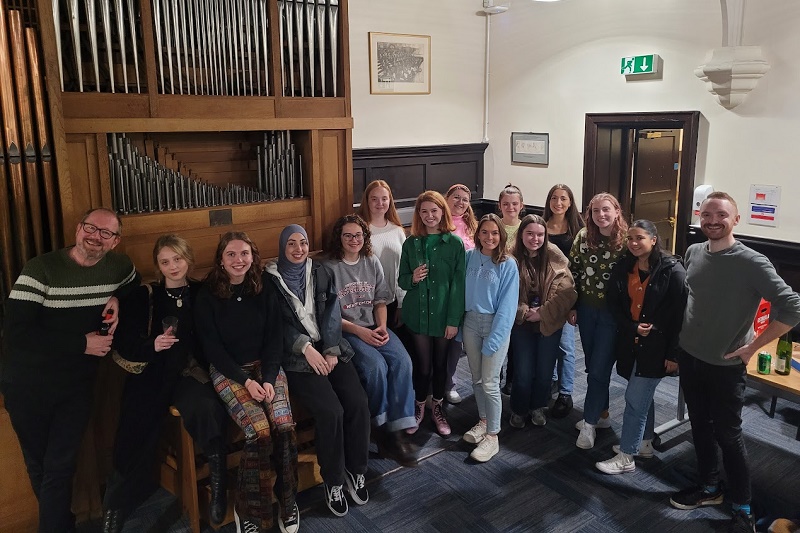
In November 2022, AEL Education Fund enabled us to have a Liberal Arts social, bringing together students from across all four years of the degree programme. Over pizza and drinks, students got to know each other better. This community building was continued in coffee mornings during the second semester, allowing everyone the chance to ‘check in’ with each other and with academic staff. Socials like these are particularly important in an interdisciplinary subject like Liberal Arts, bringing students together from across all disciplines and allowing for an exchange of ideas and experiences.
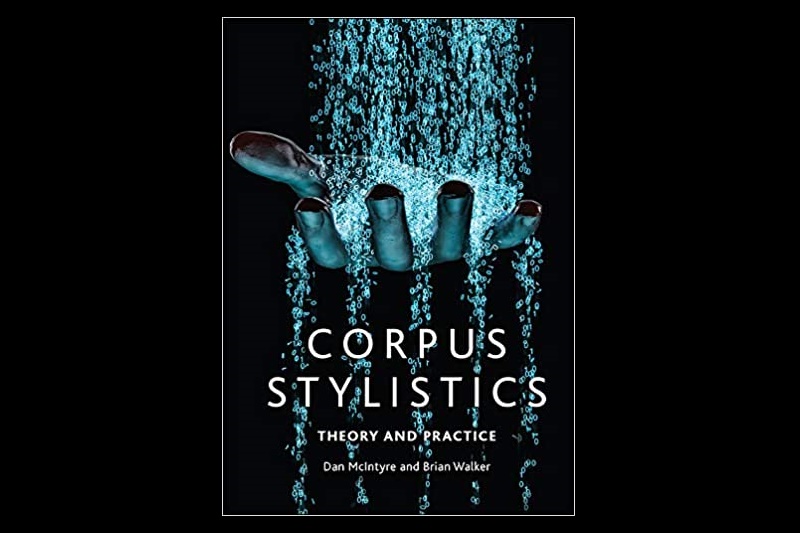
APRIL 2022
The corpus stylistics workshop introduced students to some free, online tools that can support research on how the English language is used by real speakers. Working through a series of exercises, using real language data and online or freely-downloadable tools, the workshop was a great success, with over 30 UG and PG students from across AEL in attendance.
“I am just writing to give you some thoughts on the Corpus workshop we had yesterday, which I thought was very interesting. I thought everything was very thoroughly explained, and the exercises given to us definitely helped me, and I am sure everyone else as well, to gain a better understanding on how we can conduct this analysis.
Since we have talked about using Corpus Stylistics in my essay, the workshop definitely taught me how I can incorporate this method into my analysis.“ -Janis Lai, UG Year 3 student in English with Creative Writing
“Really enjoyed this workshop, which provided a great introduction to using corpus methods. As a PhD student interested in using corpus methods in my thesis, this workshop was an invaluable chance to practice using CL software and searching various corpora in-person!” - Katherine Vage, PhD student in Linguistics
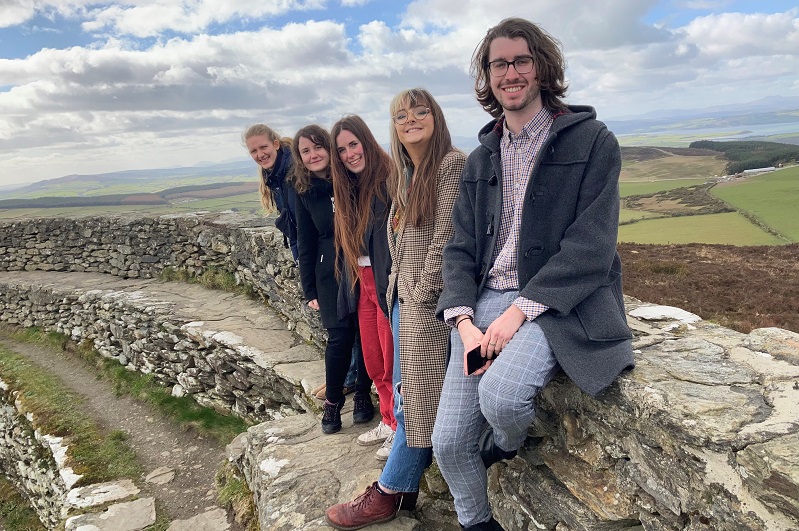
MARCH 2022
‘The field trip to Derry allowed students to physically and sensually experience the ‘sites of memory’ that we have been studying in our MA module ENG7365 ‘Trauma & Memory in Irish Literature’. In particular, it complemented our analysis of Seamus Deane’s Reading in the Dark, which is set in Derry, spanning the period from 1920s to the outbreak of the Troubles. The novel details specific sites of memory which contain the post-memory of traumatic events; these include the An Grainan fort, which we visited and, in its location, architecture and mythological resonances, it made a notable impressions on the students. Given the importance of post-memories in our curriculum and this year’s Bloody Sunday anniversary, we also visited the Museum of Free Derry, and students were able to encounter the post-memories of that important event in Northern Irish history through the materials, footage, and testimonials exhibited therein. Overall, this trip productively complemented our curriculum by offering the students important insights and understandings into post-memories of recent Northern Irish history, as reflected and represented through literature.’ Dr Stefanie Lehner, MA Module Convenor and SL in Irish Literature
‘The train journey to Derry allowed us to see some of the best sights the North Coast offers. An Grianán Ailigh was one of the highlights of the trip. After leaving the Fort we experienced an incredible contrast; leaving one of the most ancient sights in the North West to visit the Museum of Free Derry. The museum chronicles the more recent, living and tragic history of the city. The group was extremely grateful to Dr Stefanie Lehner for organising the trip.’ - Thomas Murphy, MA in Irish Studies
‘I really enjoyed my day trip to Donegal and Derry! I loved the time at Grianan fort and really connected with the other students who went too! I think it really put some of the texts on my module into perspective by experiencing the history of the north as well.’ – Danielle Blee, MA in English Literary Studies
‘The Masters Seminar field trip to Derry/Londonderry gave me the exciting opportunity to underpin my studies for my Masters Thesis in Media Design with the context of the history of Northern Ireland. Especially the excursion to the Museum of Free Derry and the old hillfort "Grianan of Aileach" above Belfast gave me deeper insights into the history of Northern Ireland. The surroundings and landscape around the city, unknown to me until then, unfolded before my eyes as we took a taxi after our arrival at the train station up to a hill on which "Grianan of Aileach" stands. Dr. Lehner had previously given us an excerpt from the novel „Reading in the Dark“ by Seamus Deane in which exactly this fort and the area were featured. This novel had been part of the seminar literature of her Master's course. After a short drive back to the city centre, we went over the city wall down to the so-called "Bogside" neighbourhood. Here we walked past the historic crossing with the wall that says "You are now entering free Derry" and visited the Museum of free Derry. At the museum we were given an intensive introduction to the history of Derry/Londonderry and a tour of the museum embedded with very easy comprehensible videos, short lecture, texts and impressive photos to learn about the events of Bloody Sunday. All in all, I am very happy to have had the experiences and impressions of that day and I am glad that they are helpful for my further progress in my Master's thesis.’ - Lisanne Conradt, Visiting MA Student from Germany, Bergische Universität Wuppertal
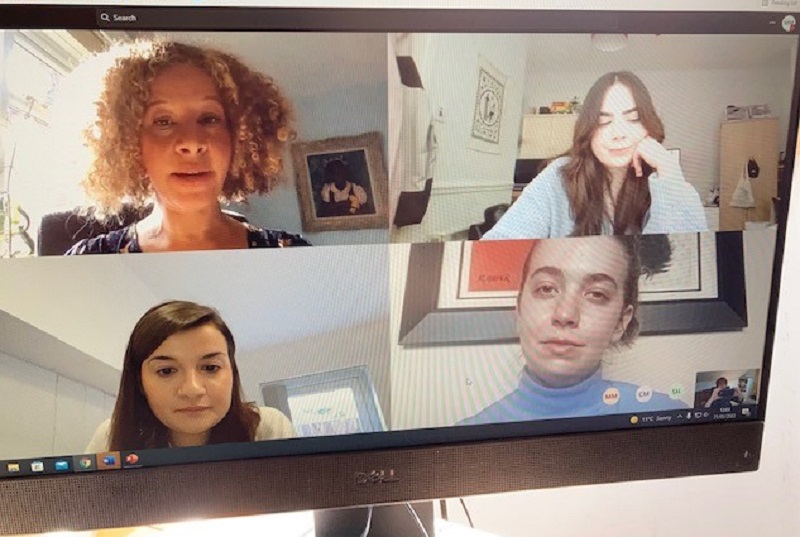
MARCH 2022
Final year students in Professor McCusker's Caribbean Cultures module were delighted to talk to Dr Emily Zobel Marshall @EmilyZMarshall, granddaughter of Joseph Zobel and Reader in Postcolonial Literature at Leeds Beckett. We discussed Emily's relationship with her grandfather, the importance of La Rue Cases-Nègres in Caribbean literature, and the pernicious effects of the pigmentocracy. We also reflected on the continuing legacies of slavery, all highly relevant against the backdrop of Kate and William's tour in Barbados. Thanks so very much to Emily for her fascinating insights.
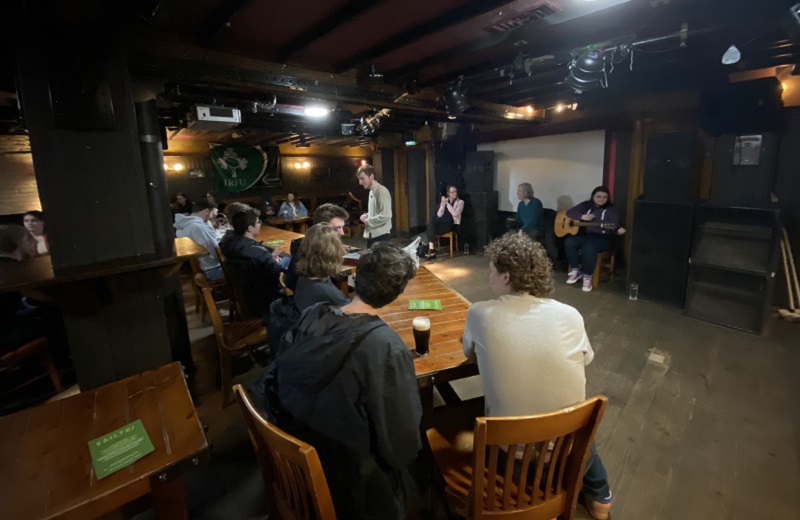
MARCH 2022
A successful day out was had on the Trail with expert guides Deidre Galway (guitar), Jason O’Rourke (concertina) and Annette Collins (dancing). Deirdre is the guitarist for the well-known Belfast band Realta while Jason is a grandee of the local scene with several successful albums to his name over the years. Annette is a dancing instructor with Belfast Trad, based at the Crescent Arts Centre.
We began our trip in The Second Fiddle in the Cathedral Quarter before taking in a stop at Belfast’s Assembly Rooms (home of The Belfast Harpers’ Assembly of 1792). The guides told the students about the route of the Farset river, under High Street, which gave Belfast its name. In McHugh's Basement we had a dance demo from Annette and some of our students learned how to dance the polka set.
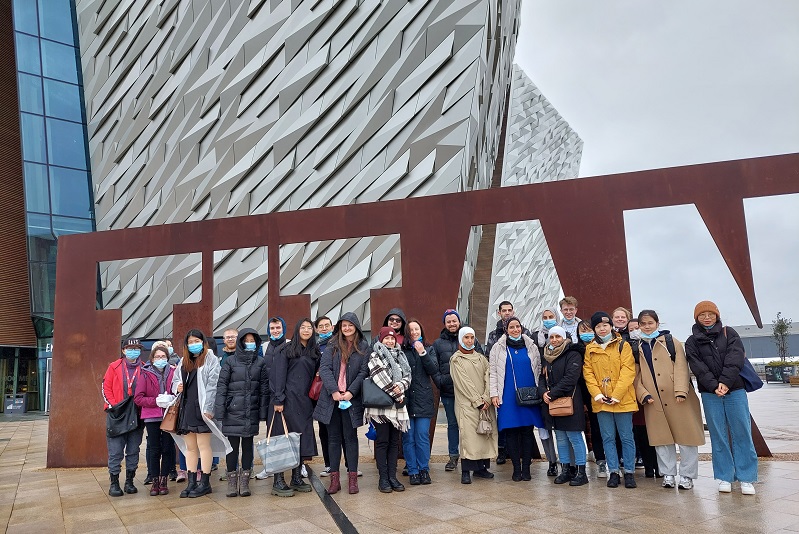
MARCH 2022
MA and PhD students from the Centre for Translation and Interpreting braved the weather on their way to Titanic Belfast on the 9 March 2022. Facilitated by the AEL Education Fund, the trip was designed to enable Translation and Interpreting students to learn about audio description and audiovisual translation in a real-life context.

